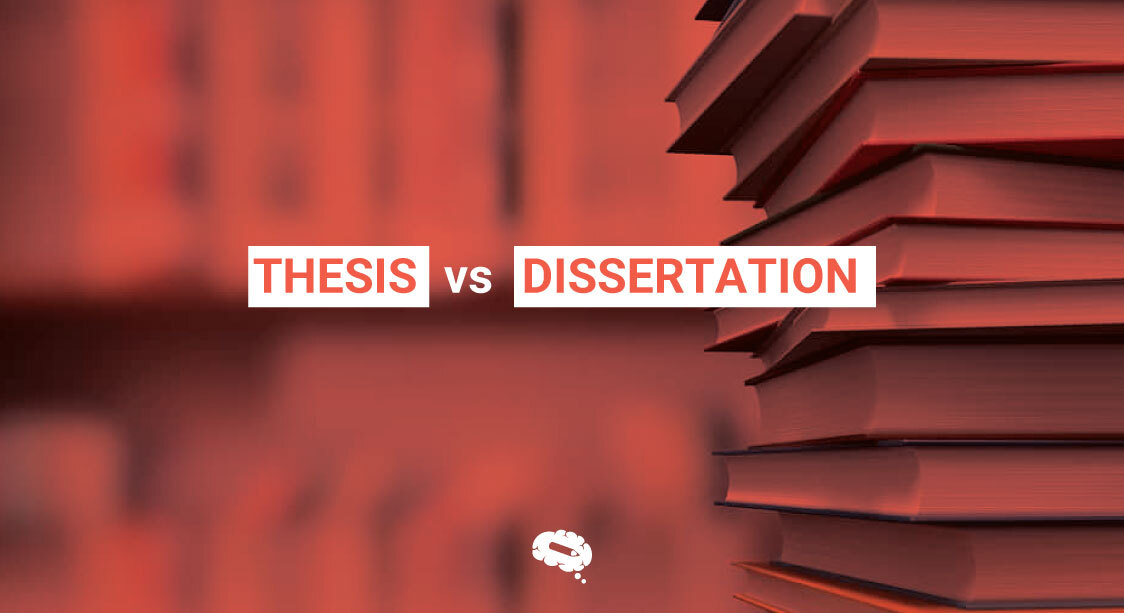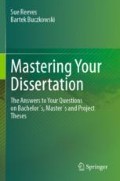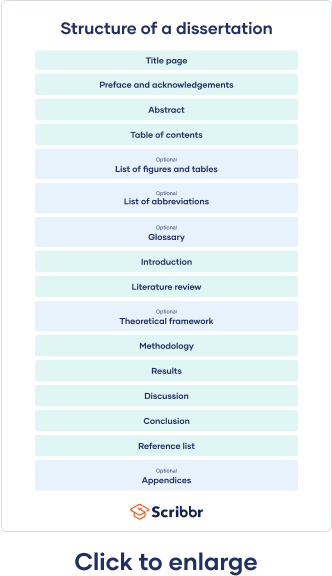
- Newsletters

Defending Your Dissertation: A Guide

Written by Luke Wink-Moran | Photo by insta_photos
Dissertation defenses are daunting, and no wonder; it’s not a “dissertation discussion,” or a “dissertation dialogue.” The name alone implies that the dissertation you’ve spent the last x number of years working on is subject to attack. And if you don’t feel trepidation for semantic reasons, you might be nervous because you don’t know what to expect. Our imaginations are great at making The Unknown scarier than reality. The good news is that you’ll find in this newsletter article experts who can shed light on what dissertations defenses are really like, and what you can do to prepare for them.
The first thing you should know is that your defense has already begun. It started the minute you began working on your dissertation— maybe even in some of the classes you took beforehand that helped you formulate your ideas. This, according to Dr. Celeste Atkins, is why it’s so important to identify a good mentor early in graduate school.
“To me,” noted Dr. Atkins, who wrote her dissertation on how sociology faculty from traditionally marginalized backgrounds teach about privilege and inequality, “the most important part of the doctoral journey was finding an advisor who understood and supported what I wanted from my education and who was willing to challenge me and push me, while not delaying me. I would encourage future PhDs to really take the time to get to know the faculty before choosing an advisor and to make sure that the members of their committee work well together.”
Your advisor will be the one who helps you refine arguments and strengthen your work so that by the time it reaches your dissertation committee, it’s ready. Next comes the writing process, which many students have said was the hardest part of their PhD. I’ve included this section on the writing process because this is where you’ll create all the material you’ll present during your defense, so it’s important to navigate it successfully. The writing process is intellectually grueling, it eats time and energy, and it’s where many students find themselves paddling frantically to avoid languishing in the “All-But-Dissertation” doldrums. The writing process is also likely to encroach on other parts of your life. For instance, Dr. Cynthia Trejo wrote her dissertation on college preparation for Latin American students while caring for a twelve-year-old, two adult children, and her aging parents—in the middle of a pandemic. When I asked Dr. Trejo how she did this, she replied:
“I don’t take the privilege of education for granted. My son knew I got up at 4:00 a.m. every morning, even on weekends, even on holidays; and it’s a blessing that he’s seen that work ethic and that dedication and the end result.”
Importantly, Dr. Trejo also exercised regularly and joined several online writing groups at UArizona. She mobilized her support network— her partner, parents, and even friends from high school to help care for her son.
The challenges you face during the writing process can vary by discipline. Jessika Iwanski is an MD/PhD student who in 2022 defended her dissertation on genetic mutations in sarcomeric proteins that lead to severe, neonatal dilated cardiomyopathy. She described her writing experience as “an intricate process of balancing many things at once with a deadline (defense day) that seems to be creeping up faster and faster— finishing up experiments, drafting the dissertation, preparing your presentation, filling out all the necessary documents for your defense and also, for MD/PhD students, beginning to reintegrate into the clinical world (reviewing your clinical knowledge and skill sets)!”
But no matter what your unique challenges are, writing a dissertation can take a toll on your mental health. Almost every student I spoke with said they saw a therapist and found their sessions enormously helpful. They also looked to the people in their lives for support. Dr. Betsy Labiner, who wrote her dissertation on Interiority, Truth, and Violence in Early Modern Drama, recommended, “Keep your loved ones close! This is so hard – the dissertation lends itself to isolation, especially in the final stages. Plus, a huge number of your family and friends simply won’t understand what you’re going through. But they love you and want to help and are great for getting you out of your head and into a space where you can enjoy life even when you feel like your dissertation is a flaming heap of trash.”
While you might sometimes feel like your dissertation is a flaming heap of trash, remember: a) no it’s not, you brilliant scholar, and b) the best dissertations aren’t necessarily perfect dissertations. According to Dr. Trejo, “The best dissertation is a done dissertation.” So don’t get hung up on perfecting every detail of your work. Think of your dissertation as a long-form assignment that you need to finish in order to move onto the next stage of your career. Many students continue revising after graduation and submit their work for publication or other professional objectives.
When you do finish writing your dissertation, it’s time to schedule your defense and invite friends and family to the part of the exam that’s open to the public. When that moment comes, how do you prepare to present your work and field questions about it?
“I reread my dissertation in full in one sitting,” said Dr. Labiner. “During all my time writing it, I’d never read more than one complete chapter at a time! It was a huge confidence boost to read my work in full and realize that I had produced a compelling, engaging, original argument.”
There are many other ways to prepare: create presentation slides and practice presenting them to friends or alone; think of questions you might be asked and answer them; think about what you want to wear or where you might want to sit (if you’re presenting on Zoom) that might give you a confidence boost. Iwanksi practiced presenting with her mentor and reviewed current papers to anticipate what questions her committee might ask. If you want to really get in the zone, you can emulate Dr. Labiner and do a full dress rehearsal on Zoom the day before your defense.
But no matter what you do, you’ll still be nervous:
“I had a sense of the logistics, the timing, and so on, but I didn’t really have clear expectations outside of the structure. It was a sort of nebulous three hours in which I expected to be nauseatingly terrified,” recalled Dr. Labiner.
“I expected it to be terrifying, with lots of difficult questions and constructive criticism/comments given,” agreed Iwanski.
“I expected it to be very scary,” said Dr. Trejo.
“I expected it to be like I was on trial, and I’d have to defend myself and prove I deserved a PhD,” said Dr Atkins.
And, eventually, inexorably, it will be time to present.
“It was actually very enjoyable” said Iwanski. “It was more of a celebration of years of work put into this project—not only by me but by my mentor, colleagues, lab members and collaborators! I felt very supported by all my committee members and, rather than it being a rapid fire of questions, it was more of a scientific discussion amongst colleagues who are passionate about heart disease and muscle biology.”
“I was anxious right when I logged on to the Zoom call for it,” said Dr. Labiner, “but I was blown away by the number of family and friends that showed up to support me. I had invited a lot of people who I didn’t at all think would come, but every single person I invited was there! Having about 40 guests – many of them joining from different states and several from different countries! – made me feel so loved and celebrated that my nerves were steadied very quickly. It also helped me go into ‘teaching mode’ about my work, so it felt like getting to lead a seminar on my most favorite literature.”
“In reality, my dissertation defense was similar to presenting at an academic conference,” said Dr. Atkins. “I went over my research in a practiced and organized way, and I fielded questions from the audience.
“It was a celebration and an important benchmark for me,” said Dr. Trejo. “It was a pretty happy day. Like the punctuation at the end of your sentence: this sentence is done; this journey is done. You can start the next sentence.”
If you want to learn more about dissertations in your own discipline, don’t hesitate to reach out to graduates from your program and ask them about their experiences. If you’d like to avail yourself of some of the resources that helped students in this article while they wrote and defended their dissertations, check out these links:
The Graduate Writing Lab
https://thinktank.arizona.edu/writing-center/graduate-writing-lab
The Writing Skills Improvement Program
https://wsip.arizona.edu
Campus Health Counseling and Psych Services
https://caps.arizona.edu
https://www.scribbr.com/

13 Tips to Prepare for Your PhD Dissertation Defense
How well do you know your project? Years of experiments, analysis of results, and tons of literature study, leads you to how well you know your research study. And, PhD dissertation defense is a finale to your PhD years. Often, researchers question how to excel at their thesis defense and spend countless hours on it. Days, weeks, months, and probably years of practice to complete your doctorate, needs to surpass the dissertation defense hurdle.
In this article, we will discuss details of how to excel at PhD dissertation defense and list down some interesting tips to prepare for your thesis defense.
Table of Contents
What Is Dissertation Defense?
Dissertation defense or Thesis defense is an opportunity to defend your research study amidst the academic professionals who will evaluate of your academic work. While a thesis defense can sometimes be like a cross-examination session, but in reality you need not fear the thesis defense process and be well prepared.
Source: https://www.youtube.com/c/JamesHaytonPhDacademy
What are the expectations of committee members.
Choosing the dissertation committee is one of the most important decision for a research student. However, putting your dissertation committee becomes easier once you understand the expectations of committee members.
The basic function of your dissertation committee is to guide you through the process of proposing, writing, and revising your dissertation. Moreover, the committee members serve as mentors, giving constructive feedback on your writing and research, also guiding your revision efforts.
The dissertation committee is usually formed once the academic coursework is completed. Furthermore, by the time you begin your dissertation research, you get acquainted to the faculty members who will serve on your dissertation committee. Ultimately, who serves on your dissertation committee depends upon you.
Some universities allow an outside expert (a former professor or academic mentor) to serve on your committee. It is advisable to choose a faculty member who knows you and your research work.
How to Choose a Dissertation Committee Member?
- Avoid popular and eminent faculty member
- Choose the one you know very well and can approach whenever you need them
- A faculty member whom you can learn from is apt.
- Members of the committee can be your future mentors, co-authors, and research collaborators. Choose them keeping your future in mind.
How to Prepare for Dissertation Defense?

1. Start Your Preparations Early
Thesis defense is not a 3 or 6 months’ exercise. Don’t wait until you have completed all your research objectives. Start your preparation well in advance, and make sure you know all the intricacies of your thesis and reasons to all the research experiments you conducted.
2. Attend Presentations by Other Candidates
Look out for open dissertation presentations at your university. In fact, you can attend open dissertation presentations at other universities too. Firstly, this will help you realize how thesis defense is not a scary process. Secondly, you will get the tricks and hacks on how other researchers are defending their thesis. Finally, you will understand why dissertation defense is necessary for the university, as well as the scientific community.
3. Take Enough Time to Prepare the Slides
Dissertation defense process harder than submitting your thesis well before the deadline. Ideally, you could start preparing the slides after finalizing your thesis. Spend more time in preparing the slides. Make sure you got the right data on the slides and rephrase your inferences, to create a logical flow to your presentation.
4. Structure the Presentation
Do not be haphazard in designing your presentation. Take time to create a good structured presentation. Furthermore, create high-quality slides which impresses the committee members. Make slides that hold your audience’s attention. Keep the presentation thorough and accurate, and use smart art to create better slides.
5. Practice Breathing Techniques
Watch a few TED talk videos and you will notice that speakers and orators are very fluent at their speech. In fact, you will not notice them taking a breath or falling short of breath. The only reason behind such effortless oratory skill is practice — practice in breathing technique.
Moreover, every speaker knows how to control their breath. Long and steady breaths are crucial. Pay attention to your breathing and slow it down. All you need I some practice prior to this moment.
6. Create an Impactful Introduction
The audience expects a lot from you. So your opening statement should enthrall the audience. Furthermore, your thesis should create an impact on the members; they should be thrilled by your thesis and the way you expose it.
The introduction answers most important questions, and most important of all “Is this presentation worth the time?” Therefore, it is important to make a good first impression , because the first few minutes sets the tone for your entire presentation.
7. Maintain Your Own List of Questions
While preparing for the presentation, make a note of all the questions that you ask yourself. Try to approach all the questions from a reader’s point of view. You could pretend like you do not know the topic and think of questions that could help you know the topic much better.
The list of questions will prepare you for the questions the members may pose while trying to understand your research. Attending other candidates’ open discussion will also help you assume the dissertation defense questions.
8. Practice Speech and Body Language
After successfully preparing your slides and practicing, you could start focusing on how you look while presenting your thesis. This exercise is not for your appearance but to know your body language and relax if need be.
Pay attention to your body language. Stand with your back straight, but relax your shoulders. The correct posture will give you the feel of self-confidence. So, observe yourself in the mirror and pay attention to movements you make.
9. Give Mock Presentation
Giving a trial defense in advance is a good practice. The most important factor for the mock defense is its similarity to your real defense, so that you get the experience that prepares for the actual defense.
10. Learn How to Handle Mistakes
Everyone makes mistakes. However, it is important to carry on. Do not let the mistakes affect your thesis defense. Take a deep breath and move on to the next point.
11. Do Not Run Through the Presentation
If you are nervous, you would want to end the presentation as soon as possible. However, this situation will give rise to anxiety and you will speak too fast, skipping the essential details. Eventually, creating a fiasco of your dissertation defense .
12. Get Plenty of Rest
Out of the dissertation defense preparation points, this one is extremely important. Obviously, sleeping a day before your big event is hard, but you have to focus and go to bed early, with the clear intentions of getting the rest you deserve.
13. Visualize Yourself Defending Your Thesis
This simple exercise creates an immense impact on your self-confidence. All you have to do is visualize yourself giving a successful presentation each evening before going to sleep. Everyday till the day of your thesis defense, see yourself standing in front of the audience and going from one point to another.
This exercise takes a lot of commitment and persistence, but the results in the end are worth it. Visualization makes you see yourself doing the scary thing of defending your thesis.
If you have taken all these points into consideration, you are ready for your big day. You have worked relentlessly for your PhD degree , and you will definitely give your best in this final step.
Have you completed your thesis defense? How did you prepare for it and how was your experience throughout your dissertation defense ? Do write to us or comment below.
The tips are very useful.I will recomend it to our students.
Excellent. As a therapist trying to help a parent of a candidate, I am very impressed and thankful your concise, clear, action-oriented article. Thank you.
Thanks for your sharing. It is so good. I can learn a lot from your ideas. Hope that in my dissertation defense next time I can pass
The tips are effective. Will definitely apply them in my dissertation.
Rate this article Cancel Reply
Your email address will not be published.

Enago Academy's Most Popular Articles

- Reporting Research
Choosing the Right Analytical Approach: Thematic analysis vs. content analysis for data interpretation
In research, choosing the right approach to understand data is crucial for deriving meaningful insights.…

Comparing Cross Sectional and Longitudinal Studies: 5 steps for choosing the right approach
The process of choosing the right research design can put ourselves at the crossroads of…

- Career Corner
Unlocking the Power of Networking in Academic Conferences
Embarking on your first academic conference experience? Fear not, we got you covered! Academic conferences…

Research Recommendations – Guiding policy-makers for evidence-based decision making
Research recommendations play a crucial role in guiding scholars and researchers toward fruitful avenues of…

- AI in Academia
Disclosing the Use of Generative AI: Best practices for authors in manuscript preparation
The rapid proliferation of generative and other AI-based tools in research writing has ignited an…
Setting Rationale in Research: Cracking the code for excelling at research
Mitigating Survivorship Bias in Scholarly Research: 10 tips to enhance data integrity
The Power of Proofreading: Taking your academic work to the next level
Facing Difficulty Writing an Academic Essay? — Here is your one-stop solution!

Sign-up to read more
Subscribe for free to get unrestricted access to all our resources on research writing and academic publishing including:
- 2000+ blog articles
- 50+ Webinars
- 10+ Expert podcasts
- 50+ Infographics
- 10+ Checklists
- Research Guides
We hate spam too. We promise to protect your privacy and never spam you.
I am looking for Editing/ Proofreading services for my manuscript Tentative date of next journal submission:

What should universities' stance be on AI tools in research and academic writing?
Preparing For Your Dissertation Defense
13 Key Questions To Expect In The Viva Voce
By: Derek Jansen (MBA) & David Phair (PhD) . Reviewed By: Dr Eunice Rautenbach | June 2021
Preparing for your dissertation or thesis defense (also called a “viva voce”) is a formidable task . All your hard work over the years leads you to this one point, and you’ll need to defend yourself against some of the most experienced researchers you’ve encountered so far.
It’s natural to feel a little nervous.
In this post, we’ll cover some of the most important questions you should be able to answer in your viva voce, whether it’s for a Masters or PhD degree. Naturally, they might not arise in exactly the same form (some may not come up at all), but if you can answer these questions well, it means you’re in a good position to tackle your oral defense.

Viva Voce Prep: 13 Essential Questions
- What is your study about and why did you choose to research this in particular?
- How did your research questions evolve during the research process?
- How did you decide on which sources to include in your literature review?
- How did you design your study and why did you take this approach?
- How generalisable and valid are the findings?
- What were the main shortcomings and limitations created by your research design?
- How did your findings relate to the existing literature?
- What were your key findings in relation to the research questions?
- Were there any findings that surprised you?
- What biases may exist in your research?
- How can your findings be put into practice?
- How has your research contributed to current thinking in the field?
- If you could redo your research, how would you alter your approach?
#1: What is your study about and why did you choose to research this in particular?
This question, a classic party starter, is pretty straightforward.
What the dissertation or thesis committee is assessing here is your ability to clearly articulate your research aims, objectives and research questions in a concise manner. Concise is the keyword here – you need to clearly explain your research topic without rambling on for a half-hour. Don’t feel the need to go into the weeds here – you’ll have many opportunities to unpack the details later on.
In the second half of the question, they’re looking for a brief explanation of the justification of your research. In other words, why was this particular set of research aims, objectives and questions worth addressing? To address this question well in your oral defense, you need to make it clear what gap existed within the research and why that gap was worth filling.
#2: How did your research questions evolve during the research process?
Good research generally follows a long and winding path . It’s seldom a straight line (unless you got really lucky). What they’re assessing here is your ability to follow that path and let the research process unfold.
Specifically, they’ll want to hear about the impact that the literature review process had on you in terms of shaping the research aims, objectives and research questions . For example, you may have started with a certain set of aims, but then as you immersed yourself in the literature, you may have changed direction. Similarly, your initial fieldwork findings may have turned out some unexpected data that drove you to adjust or expand on your initial research questions.
Long story short – a good defense involves clearly describing your research journey , including all the twists and turns. Adjusting your direction based on findings in the literature or the fieldwork shows that you’re responsive , which is essential for high-quality research.

#3: How did you decide on which sources to include in your literature review?
A comprehensive literature review is the foundation of any high-quality piece of research. With this question, your dissertation or thesis committee are trying to assess which quality criteria and approach you used to select the sources for your literature review.
Typically, good research draws on both the seminal work in the respective field and more recent sources . In other words, a combination of the older landmark studies and pivotal work, along with up-to-date sources that build on to those older studies. This combination ensures that the study has a rock-solid foundation but is not out of date.
So, make sure that your study draws on a mix of both the “classics” and new kids on the block, and take note of any major evolutions in the literature that you can use as an example when asked this question in your viva voce.
#4: How did you design your study and why did you take this approach?
This is a classic methodological question that you can almost certainly expect in some or other shape.
What they’re looking for here is a clear articulation of the research design and methodology, as well as a strong justification of each choice . So, you need to be able to walk through each methodological choice and clearly explain both what you did and why you did it. The why is particularly important – you need to be able to justify each choice you made by clearly linking your design back to your research aims, objectives and research questions, while also taking into account practical constraints.
To ensure you cover every base, check out our research methodology vlog post , as well as our post covering the Research Onion .

#5: How generalizable and valid are the findings?
This question is aimed at specifically digging into your understanding of the sample and how that relates to the population, as well as potential validity issues in your methodology.
To answer question this well, you’ll need to critically assess your sample and findings and consider if they truly apply to the entire population, as well as whether they assessed what they set out to. Note that there are two components here – generalizability and validity . Generalizability is about how well the sample represents the population. Validity is about how accurately you’ve measured what you intended to measure .
To ace this part of your dissertation defense, make sure that you’re very familiar with the concepts of generalizability , validity and reliability , and how these apply to your research. Remember, you don’t need to achieve perfection – you just need to be aware of the strengths and weaknesses of your research (and how the weaknesses could be improved upon).
Need a helping hand?
#6: What were the main shortcomings and limitations created by your research design?
This question picks up where the last one left off.
As I mentioned, it’s perfectly natural that your research will have shortcomings and limitations as a result of your chosen design and methodology. No piece of research is flawless. Therefore, a good dissertation defense is not about arguing that your work is perfect, but rather it’s about clearly articulating the strengths and weaknesses of your approach.
To address this question well, you need to think critically about all of the potential weaknesses your design may have, as well as potential responses to these (which could be adopted in future research) to ensure you’re well prepared for this question. For a list of common methodological limitations, check out our video about research limitations here .
#7: How did your findings relate to the existing literature?
This common dissertation defense question links directly to your discussion chapter , where you would have presented and discussed the findings in relation to your literature review.
What your dissertation or thesis committee is assessing here is your ability to compare your study’s findings to the findings of existing research . Specifically, you need to discuss which findings aligned with existing research and which findings did not. For those findings that contrasted against existing research, you should also explain what you believe to be the reasons for this.
As with many questions in a viva voce, it’s both the what and the why that matter here. So, you need to think deeply about what the underlying reasons may be for both the similarities and differences between your findings and those of similar studies.

#8: What were your key findings in relation to the research questions?
This question is similar to the last one in that it too focuses on your research findings. However, here the focus is specifically on the findings that directly relate to your research questions (as opposed to findings in general).
So, a good way to prepare for this question is to step back and revisit your research questions . Ask yourself the following:
- What exactly were you asking in those questions, and what did your research uncover concerning them?
- Which questions were well answered by your study and which ones were lacking?
- Why were they lacking and what more could be done to address this in future research?
Conquering this part dissertation defense requires that you focus squarely on the research questions. Your study will have provided many findings (hopefully!), and not all of these will link directly to the research questions. Therefore, you need to clear your mind of all of the fascinating side paths your study may have lead you down and regain a clear focus on the research questions .
#9: Were there any findings that surprised you?
This question is two-pronged.
First, you should discuss the surprising findings that were directly related to the original research questions . Going into your research, you likely had some expectations in terms of what you would find, so this is your opportunity to discuss the outcomes that emerged as contrary to what you initially expected. You’ll also want to think about what the reasons for these contrasts may be.
Second, you should discuss the findings that weren’t directly related to the research questions, but that emerged from the data set . You may have a few or you may have none – although generally there are a handful of interesting musings that you can glean from the data set. Again, make sure you can articulate why you find these interesting and what it means for future research in the area.
What the committee is looking for in this type of question is your ability to interpret the findings holistically and comprehensively , and to respond to unexpected data. So, take the time to zoom out and reflect on your findings thoroughly.

#10: What biases may exist in your research?
Biases… we all have them.
For this question, you’ll need to think about potential biases in your research , in the data itself but also in your interpretation of the data. With this question, your committee is assessing whether you have considered your own potential biases and the biases inherent in your analysis approach (i.e. your methodology). So, think carefully about these research biases and be ready to explain how these may exist in your study.
In an oral defense, this question is often followed up with a question on how the biases were mitigated or could be mitigated in future research. So, give some thought not just to what biases may exist, but also the mitigation measures (in your own study and for future research).
#11: How can your findings be put into practice?
Another classic question in the typical viva voce.
With this question, your committee is assessing your ability to bring your findings back down to earth and demonstrate their practical value and application. Importantly, this question is not about the contribution to academia or the overall field of research (we’ll get to that next) – it is specifically asking about how this newly created knowledge can be used in the real world.
Naturally, the actionability of your findings will vary depending on the nature of your research topic. Some studies will produce many action points and some won’t. If you’re researching marketing strategies within an industry, for example, you should be able to make some very specific recommendations for marketing practitioners in that industry.
To help you flesh out points for this question, look back at your original justification for the research (i.e. in your introduction and literature review chapters). What were the driving forces that led you to research your specific topic? That justification should help you identify ways in which your findings can be put into practice.
#12: How has your research contributed to current thinking in the field?
While the previous question was aimed at practical contribution, this question is aimed at theoretical contribution . In other words, what is the significance of your study within the current body of research? How does it fit into the existing research and what does it add to it?
This question is often asked by a field specialist and is used to assess whether you’re able to place your findings into the research field to critically convey what your research contributed. This argument needs to be well justified – in other words, you can’t just discuss what your research contributed, you need to also back each proposition up with a strong why .
To answer this question well, you need to humbly consider the quality and impact of your work and to be realistic in your response. You don’t want to come across as arrogant (“my work is groundbreaking”), nor do you want to undersell the impact of your work. So, it’s important to strike the right balance between realistic and pessimistic .
This question also opens the door to questions about potential future research . So, think about what future research opportunities your study has created and which of these you feel are of the highest priority.

#13: If you could redo your research, how would you alter your approach?
This question is often used to wrap up a viva voce as it brings the discussion full circle.
Here, your committee is again assessing your ability to clearly identify and articulate the limitations and shortcomings of your research, both in terms of research design and topic focus . Perhaps, in hindsight, it would have been better to use a different analysis method or data set. Perhaps the research questions should have leaned in a slightly different direction. And so on.
This question intends to assess whether you’re able to look at your work critically , assess where the weaknesses are and make recommendations for the future. This question often sets apart those who did the research purely because it was required, from those that genuinely engaged with their research. So, don’t hold back here – reflect on your entire research journey ask yourself how you’d do things differently if you were starting with a blank canvas today.
Recap: The 13 Key Dissertation Defense Questions
To recap, here are the 13 questions you need to be ready for to ace your dissertation or thesis oral defense:
As I mentioned, this list of dissertation defense questions is certainly not exhaustive – don’t assume that we’ve covered every possible question here. However, these questions are quite likely to come up in some shape or form in a typical dissertation or thesis defense, whether it’s for a Master’s degree, PhD or any other research degree. So, you should take the time to make sure you can answer them well.
If you need assistance preparing for your dissertation defense or viva voce, get in touch with us to discuss 1-on-1 coaching. We can critically review your research and identify potential issues and responses, as well as undertake a mock oral defense to prepare you for the pressures and stresses on the day.

Psst… there’s more (for free)
This post is part of our dissertation mini-course, which covers everything you need to get started with your dissertation, thesis or research project.
You Might Also Like:

12 Comments
Very interesting
Interesting. I appreciate!
Really appreciating
My field is International Trade
Interesting
This is a full course on defence. I was fabulously enlightened and I gained enough confidence for my upcoming Masters Defence.
There are many lessons to learn and the simplicity in presentationmakes thee reader say “YesI can”
This is so helping… it has Enlightened me on how to answer specific questions. I pray to make it through for my upcoming defense
Lovely to hear that 🙂
Really educative and beneficial
Interesting. On-point and elaborate. And comforting too! Thanks.
Thank you very much for the enlightening me, be blessed
Thankyou so much. I am planning to defend my thesis soon and I found this very useful
Very interesting and useful to all masters and PhD students
Submit a Comment Cancel reply
Your email address will not be published. Required fields are marked *
Save my name, email, and website in this browser for the next time I comment.
- Print Friendly

Researched by Consultants from Top-Tier Management Companies

Powerpoint Templates
Icon Bundle
Kpi Dashboard
Professional
Business Plans
Swot Analysis
Gantt Chart
Business Proposal
Marketing Plan
Project Management
Business Case
Business Model
Cyber Security
Business PPT
Digital Marketing
Digital Transformation
Human Resources
Product Management
Artificial Intelligence
Company Profile
Acknowledgement PPT
PPT Presentation
Reports Brochures
One Page Pitch
Interview PPT
All Categories
The Ultimate Guide to Delivering an Outstanding Master's or PhD Thesis Dissertation Defense Presentation (Over 20 Templates Included)

“Congratulations, Dr. (Your Name)”
These words can be music to the ears of a research scholar at the end of their master’s dissertation defense presentation. All those years of hard work ( and the occasional partying ) on an A-list university campus boil down to you earning the title of a doctorate. Your blood, sweat and tears ( mostly tears ) invested in the doctoral subject of your choice just to hear the committee assign you that title rest on one (not so) simple thing: your dissertation defense.
However, to ensure that you, indeed, achieve your goal of earning that title, you have to ace your dissertation defense. You want to impress the committee. You want to ignite their minds. And more so, you want to be prepared for all the hard-hitting questions they are going to pose when you click through your dissertation defense presentation slides and explain what all you grasped in your years of research at the university.
Nerve-wracking may be an understatement, wouldn’t it?
Accomplishing that PhD with a well-presented dissertation defense can be an uphill battle for those who get the jitters while facing an audience. Plus, anticipation of top-level questions from experts in your field can leave you hot under the collar. You want to ace that dissertation defense, no matter what.
Fear not! This blog will break it down for you. Read on to find out how to make your master's or PhD thesis dissertation defense an outstanding medium to charm the thesis committee with ease.
The preparation
Now, before the dissertation defense, you have to prepare for it well in advance. Just organize your thoughts and prepare your thesis in a well-structured manner before you hand it over to the thesis committee. When you have studied a particular topic at length, you are able to devise a strategy for presenting it to the experts as well. Doctoral research gives you extensive knowledge about a topic which you can see yourself working with in your future prospects. Mostly university programs are inclined to the analyzing how the research has been fruitful with your endeavors. Here, you must note some important points to prepare well.
Know thy audience
When you have your dissertation defense to prepare, it bodes well for you if you try to get to know your audience, i.e. the members of the thesis committee. Before you make the final submission to the committee chair, make a checklist of what all you have included in the dissertation report. In fact, submit the report at least a month in advance so that the chair is ready to capture what your point of contention will be. You do not have to just brush things off with the normal two-week-prior submission. You have to give yourself a chance to prepare for what the committee members can ask you as per their expertise.
While you can ask your adviser or guide to take in the subject, it will also work well if you meet the chair in person for advice on the general thought process of the committee members. So instead of going into the meeting room unarmed, you will have a bit of a groundwork laid for yourself. It is all in the mind, but it is also all in a bit of a control.
Watch, ask and learn
Your research adviser or guide is your biggest asset when it comes to earning that doctoral degree. Since a dissertation is based on what you have explored and found out during the university course based on an original research, you can get the best advice from your guide. Ask them what kind of presentation methodology you need to adhere to. You can also take reference from the university’s scholar resources.
More so, since the dissertation defense presentations are open in most of the universities, you can attend these to get an idea of the procedure involved. Watch closely how the committee dwells on the key aspect of a scholar’s research. Also, see how the scholar handles the questions, the tough ones. Is that a straight “No I don’t know.” or something refined like “I speculate that…”? Ask the previous scholars who have presented their dissertation in front of the committee members you have. The more similar the subject, the better your chances of nailing that presentation.
Accustom yourself
Yes. Everybody has thrown this one at you before an exam (or a date). Practice makes perfect. When we talk of laying the groundwork, it involves booking the meeting room and the committee members’ schedule for your final dissertation defense well in advance to avoid any lapses. University research experts and thesis committee members have busy schedules around which you need to plan your dissertation defense. Planning in advance can keep you from having the last-minute anxieties.
- A secret to giving an outstanding dissertation defense presentation is to present in front of your colleagues or friends. It will be a bonus if this practice audience is a mix of scholars from your field and different fields as well. The idea is to influence the minds of the listeners as analogous to those of the committee members. Use notes and feedback from this audience to plan out what you will say on the day of the presentation.
- Another secret to being well-prepared is to keep the chosen committee members in loop with your research process after you have submitted a dissertation proposal. You can ask them for reviews and incorporate the changes they suggest. These changes can then give you an indication on what could be the basis of the questions the committee will ask. Since the experts are aligned to pose such questions as interest their mind for exploration, you can keep a track of the reviews you have subjected your dissertation to. If the committee members suggest some major changes and you make them, keeping them in the loop will help avoid any last-minute surprises, and therefore, blunders.
- Since university doctoral research has to be published online and even distributed as written text, it is important to take some guidance from your adviser and teachers about formatting standards. It makes it easy if you get it formatted well enough before submitting the manuscript to the committee members for final notes and revision suggestions. Each institute may have their own standards for devising a dissertation manuscript. So know the process to avoid careless mistakes. Your research matters not only to you, but to the university as well.
- Ask your adviser how much time is allotted to each part of your dissertation defense presentation. This way you can plan as much material as you should for your presentation. Time slots will keep you structured throughout your presentation. You can focus on the key issues and give time to each topic as per the structure as follows.
Make your presentation right
Your dissertation defense presentation is your masterpiece. It can sway the committee members in your favor. Designing a good dissertation ppt presentation that implores the audience to say that much-wanted YES is an art. Once you get the basics right, you will start off with a bang. The basic setup which you should employ while putting together your presentation is as follows:
The very first slide of the presentation is going to be your title slide. It should include the name of your thesis and your name. Mention the university’s name in a prominent manner as well. A catchy title slide can keep your audience visually stimulated before the presentation.

#2 Introduction
You have a well-defined slot within which you introduce the subject of your doctoral research. You have to cover broad points by focusing on the pain point first. You can take an example of how that pain point is leading to an issue that needs attention. The introduction has to enlist what objectives your research has tried to achieve to address these pain points. Here the key point is to show that you have tried to solve a problem with your research. You can give the scope of the research too. Starting off with an anecdote may also help get the committee members interested in your topic up front. Make sure you include these points in your introduction slide.

#3 Literature review
Often one of the common mistakes that scholars do while dissertation defense is getting too much into the literature review. If you have studied and included the findings of a particular research to support your thesis, you do not have to dwell on it. Simply create a crisp outline of the research literature that relates to your thesis. You can include how the literature is relevant or brings out any weak points that you may have addressed in your research.
#4 Methodology
You have covered the what of your thesis. On this slide, you will cover the how of it. On this slide, you need to explain what you did to address the pain points listed in the introduction. Did you conduct a survey of a considerable sample size to apply your research to? What were the subjects of the survey categorized into? How did you organize and process the data? This slide (or slides) can show the committee members the tools at your disposal and how you used them to support your claims.

#5 Findings
You used the collected data in every decipherable manner you could. But what you found through processing and extrapolating that data as per your thesis goes on this slide. You can use simple infographics to draw comparison or to highlight the specific results that you want the committee members to take note of. The trick here is to make the information as captivating yet concise as possible. Make sure you put the spotlight on the findings that address the pain points or at least enhance the committee’s discretion regarding your thesis.

#6 Deliberation
On this slide for discussion, you have to enlighten the committee on how the findings have a bearing on your research. What it means for the issues that you listed as worthy of being addressed? You can elaborate how using your findings you have come up with some innovative solution to a problem.

#7 Conclusion
You have started well. So end well too. On the conclusion slide, just keep it short and sweet on how your research addresses the scope of the subject. You can also impress the committee with giving how your processed data can serve as the foundation stone of many more research projects in your field (if there is any).

- Know your subject inside out. Take time to review what your thesis proposal tries to encompass. Enlist all the possible questions that you have found out to be of the committee’s interest.
- Also, enlist the questions that you fear the committee may ask. These are trick questions for which you should have an answer ready.
- You have to organize your thesis precisely. Take your time arranging your thoughts well.
- Take a closer look at the already published manuscripts to have an idea of what content to dabble with while preparing for your dissertation defense.
- Prepare handouts in accordance with your presentation. You can take printouts of the presentation slides and put them together so that the committee can follow along.
- A quick proofread of all the material you prepare or print won’t hurt either.
- Do not fret or be nervous about the presentation.
- Do not clutter the presentation slides with content. Just keep it crisp enough so that the committee stays engaged with you while taking cues from the slides or handouts.
- Do not forget to analyze the accuracy of the data sets and the projections. Your findings are your foundation. Accuracy and precision are key.
The dissertation defense
Had a good night sleep the day before the defense presentation? Good! Because a relaxed mind is paramount for an effective dissertation defense. The meeting is nothing short of a mental roller coaster. Before the presentation, hand out the printed slides to the committee so that they can follow along. During the dissertation defense, the committee will ask you questions on topics that pique their interest. So be ready to not lose focus no matter what.
Generally, the questions will mostly come at the discussion phase of the presentation so you must have a cohesive idea of how your research connects the dots. Mostly these questions will be based on why your dissertation matters, and how does it support future researches. The committee will also deliberate on the relevance of your findings to your career trajectory, besides any scope of future contributions. Here it is crucial that you have such information on your fingertips (although don’t fret if you do not know the answer at the ready).
- Know your material inside out.
- Check the meeting room arrangements an hour before the defense.
- Greet the committee members. Make eye contact with each of them.
- The committee is not there to torture you. They just want to examine the significance of your project for the university.
- Give handouts to the panel before starting the presentation so that any incoherence can be avoided.
- Pause before explaining each meticulous point of interest. Often the pressure gets the best of the most skilled orators too.
- Always, and always, take notes when the committee asks questions.
- Do not overburden your mind with data. Just know enough of important figures and you are good to go.
- Avoid getting distracted by the presentation. Just keep small notes to help the committee stay up to speed.
- Do not fall into the trap of “umm and uhhhh” during questioning. It is okay if you do not know the answer. Do not turn it into a fumbled description. You can try saying something encouraging like “I have not explored that asset to that extent, but would like to add that…” This shows your drive to learn and communicate well.
- Do not panic if there is a glitch in your presentation or a power outage. Conduct the dissertation defense with confidence. That is what handouts are for.
- Steer clear of speaking hurriedly to answer a question. Time slots can be a concern but the more you stay focused and calm, the easier you are able to handle the occasional bumps in the road.
For remote presentation
Incidentally, Covid-19 has changed the way academic presentations are conducted, though remote presentations were a thing in the past. In instances where you have to present your dissertation defense from a remote location, you must ensure proper testing of the video output that the committee members can see. Ask a friend to check it. Better yet, practice with an audience. Internet lapses can throw you off your track. So make sure you have checked each and every provision for the meeting. Last-minute obscurity of the slides may not be a good head start.
Now, for some people, employing the cyberspace to present their dissertation defense may not be ideal. Also, dissertation committee members may take part from different countries, so you have to be prepared. Make sure you email them the handouts or rather short notes so that it is easy for them to understand. Keep in touch with them digitally as and when feasible. The more you prepare in advance, the better.
After the presentation
If you have followed the steps given above, chances are that the committee has had a consensus on awarding you that YES based on your dissertation defense presentation. You have indeed earned that by being an expert in your field. But what to do after the presentation?
First and foremost, you have to officially thank all the committee members for their time and guidance. Take notes on whatever the members advise you regarding your research. Rather solicit feedback after you are done with the dissertation defense. You can also ask them to email their suggestions to you. It will help pave the way to your future courses of action. Be on the same page with your committee chairperson for what to do next. If the committee has deliberated on suggesting some revisions, you can incorporate them in your final manuscript.
Also since your research has been scrutinized well according to the university standards, you must get on with making copies of your manuscript once approved and signed by the committee members. Later on you can submit it to the university database in the library. You can also submit the final revised manuscript to your colleagues.
And then what? It is time to celebrate, of course. Circumstances and university guidelines permitting, you can have a nice celebratory function with the committee members and your family and friends to mark an important milestone in your career.
Ace that dissertation defense with these PPT templates
Since so much rests on your presentation before the committee, it is imperative that you make a mark with a well-designed presentation. You want to make a good impression with your dissertation defense. So, do it with bespoke professionally-designed dissertation defense PowerPoint presentation templates listed here. Read the highlights and choose the template that will speak for you.
As discussed above, your dissertation defense has to be your instrument of research during your master’s or PhD course. And good professional design in this template is the element you can harness. Plus the biggest beneficial factor is that you get to edit the slides in it as per your wish. In fact, when you prepare your key notes, you can just put them on the slides and present it with ease.

Download this template
We understand that every university may have a different requirement when it comes to presenting a well-researched thesis dissertation defense. So we have curated simple template designs that fulfill your needs. Take advantage of this completely editable deck to organize your thoughts and dissertation material to impress the thesis community from the get go. No matter what topic you have chosen to secure a master’s degree in, you will never go wrong with this template. Present with conviction. Present with confidence.

Meticulous is the mantra when presenting your dissertation defense with passion. It is your subject of expertise. So you must make a good impression when preparing your presentation. Take notes regarding the key points you have gotten in guidance from your adviser. Use this template with attractive infographic slides to put forward your points with credence.

When you need that zeal to support your dissertation defense, you have to present with well-represented facts and figures. This template offers fully editable design that you can mould as per your convenience. If you have fallen short of time, use this template to get bespoke design that amalgamates seamlessly with your dissertation defense content. This comes handy especially when you want the committee’s focus to be on your findings. That way, they will get straight to the point and ask questions that your research an answer.

Sure you have got some time on your hands to prepare a dissertation defense. But why spend hours and hours on figuring out the design and theme of your presentation? Do it quick with this uniform and comprehensive dissertation defense presentation template that will represent your thoughts in a much organized manner. The best part about this template is that it will come in handy in situations of time crunch when preparing for the defense has consumed much of your schedule. Smart work can make the dream work too.

Another template that will be a blessing for your readiness is this one. Herein you get a simple design that will structure your dissertation defense as per the university standards of professionalism. Usually, simplifying concepts for your audience takes a lot of studying and research, which may not leave you much time to prepare a cohesive presentation. The solution lies in this template. Just place your text onto the slides wherever applicable and remove the stuff you do not need. Present and win.

Some universities give preference to a more vibrant dissertation defense presentation. While the design requirement stays professional, a simple white theme with a smart color pattern can also magnetize the committee’s focus to your presentation. The more the retention of focus, the better are the chances of the committee understanding your subject and giving better feedback. You can leverage this recipe to success with the following template. Just edit in minutes and present with caliber.

If you want to project your ideas of research with an offbeat theme, try this template. The colors are easy on the eye and you can easily ace your dissertation defense. Plus the data charts for your findings can be used with easy to understand description. You must check with your university guidelines on drafting a presentation though. If it sticks by the rules, you have your perfect presentation at the ready.

Speaking of themes that appeal to the eye, this template has what it takes to get you that YES. No beating around the bush. Just cutting straight to the point, the template follows a procedural approach with design. Point after point, you can capture the essence of your PhD thesis in a structured manner. You can also rearrange the elements on the lucid slide to fit your requirements. Once you edit the slides, you can take printouts to give to your thesis committee for easy understanding.

Template 10
Explaining the pain points that your research is addressing takes a lot of well-structured analysis. Thereafter, aligning these points to a PowerPoint presentation that you have to make from scratch is not an easy task. Time is of the essence. And so is this thesis presentation ppt template. Edit the required text in 5 minutes with this efficient and user-friendly design. Believe in yourself and present an exquisite dissertation defense.

Template 11
The more you fidget about your presentation, the less confidence you will have. So you must concentrate on getting yourself better prepared instead of rummaging through old-school templates. Time management gets simplified when you use this template. With catchy design and highlights, this template will fit well with the professional dimensions of your dissertation defense. Get it now and get started with a bang.

Template 12
Talk of starting with a bang! To a layman, a dissertation defense may seem like an extremely scientific discussion full of jargon. But in reality it is a tool for a researcher to break down the most complex concepts and put a spotlight on their utility and admissibility through the lens of experts in the field. To tell your story the right way, use this professionally-designed template. This will be useful in those situations where you have a larger audience than just the committee.

Template 13
You know what can help you hit the bull’s eye? A good infographic. And this template has it, and much more. In fact, the infographics and icons follow a common theme to give your dissertation defense that professional edge. Just make sure you remove the dummy text wherever needed and input the text you have summarized in the abstract of your thesis. You can also use the data charts in the slides that follow to convince the committee members regarding your finding.

Template 14
Often students of master’s program ignore the importance of presenting a crisp methodology for their research in front of the thesis committee. With this template, you can use a timeline infographic to trace the projection of your research. Explain the methodology with crisp information for your audience. The template also has the bibliography slide to mention the sources of your data and project collateral. You can download the completely editable presentation and use it to sway the committee in your favor without a doubt.

Template 15
A key precaution that you ought to take while designing the perfect dissertation defense presentation is not to clutter the slides with too much text. Just keep everything crisp. In fact, to get the committee members more engaged with your slides and the corresponding handouts, use this template with minimal text. Just resize the font so that it is legible on the projection board. Clearer text with simple imagery can drive home the point that you came prepared with convincing figures.

Template 16
Icons sure are better than boring bullet points. They also add to the readability of your presentation. With this template, you can leverage an exceptional form of visual communication. You can keep as many icons as you like as per the cohesive theme that the template is designed on. Moreover, quicker presentation preparation will give you time to focus on organizing your thoughts for the dissertation defense. You can also tabulate your findings in the consecutive slides to give the committee more clarity.

Template 17
Definitive research warrants a well-structured dissertation defense. Elaborate your thoughts and ideas with this template. With this template you can offer in-depth analysis about your thesis while keeping the presentation well within the time frame as stipulated by the university guidelines. Make sure you are using the data charts and infographics the right way to represent the corresponding information. You can practice the presentation with ease through this template.

Template 18
It is all in what appeals to the eye; and in your case, the committee’s eyes. Each committee member can pose tricky questions about your study. Why is it relevant? What could be an alternative approach? Explain all that with simple points on this template that has visually appealing theme that grabs attention in an instant. You can make do without the extra slides at the back if you want to keep the presentation short. Just make sure you highlight each point of interest on every suitable slide.

Template 19
Since your thesis can catapult your prospects to successful heights, you might need a presentation that can make an impact even after you have gotten the approval of the committee and got your research published. For example, with the help of this template, you will have something that you can use for a business research proposal as well. Your dissertation proposal will be your USP for potential recruiters as well. So having this precisely designed and well-structured template will help you get the opportunity and projects you want.

Template 20
When it comes to a business setup, researchers are expected to come up with new ideas and proposals. Research is needed for sales expansion, marketing strategy and business growth. So when you get into that professional ecosystem, you must leverage your learning in the master’s program to devise well-structured research proposals as well. This template will help you put together every element of your research and project your vision for the company in an appealing manner. Present and convince the stakeholders within minutes.

Template 21
The best part about fully customizable slides in our collection is that we make it a point to elevate your presentation quotient with our designs. As far as a dissertation defense is concerned, you can easily achieve flexibility during the Q&A with the committee by keeping it short and sweet with this template. Mostly the committee is interested in how you handle the questions related to future implications of your research. You can include the points you are absolutely confident about in this template, so that the committee’s attention stays focused on these ideas. Edit this template as per your liking and let it speak for yourself.

Template 22
Every year, scholars after scholars submit their thesis and perform to their highest capacities in dissertation defense to get that coveted doctorate. Since universities expect them to adhere to the most significant levels of professionalism and structure, it is important for them to be outstanding. And outstanding comes from an outstanding template like this. It is the perfect blend of icons, visual appeal and flow. Use this template to present the most complex concepts in a simple manner.

So in conclusion, your dissertation defense has to go just perfectly for you to accomplish your academic and professional goals. And perfect comes from a perfect presentation. Follow this guide and choose from any of the listed templates to express your thoughts. If you need a little boost to that seat of success, let our design team handle the ride . Cheers to your bright future!
Related posts:
- [Updated 2023] Top 20 Hiring and Recruitment Templates in PowerPoint PPT
- Top 20 Sustainability, Social Responsibility and Climate Change Presentation Templates for Business and Environment Presentations!!
- [Updated 2023] Top 20 Organizational Behavior Presentation Templates for PowerPoint!!
- Increase The Cohesiveness Of Workplace With Our Top 20 Organizational Culture Presentation Templates for PowerPoint!!
Liked this blog? Please recommend us

3 Design Hacks to Make Images Bleed in Your Presentation

Crawl Your Text! Add News Ticker Effect to Your Presentation Using This Hack

PowerPoint vs. Other Presentation Software: Which Is Better for Creating, Presenting, and Sending Sales Pitches?

A History of Portrait and Landscape Formats: How They Started and Why We Are Still Stuck With Them
This form is protected by reCAPTCHA - the Google Privacy Policy and Terms of Service apply.

Digital revolution powerpoint presentation slides

Sales funnel results presentation layouts
3d men joinning circular jigsaw puzzles ppt graphics icons

Business Strategic Planning Template For Organizations Powerpoint Presentation Slides

Future plan powerpoint template slide


Project Management Team Powerpoint Presentation Slides

Brand marketing powerpoint presentation slides

Launching a new service powerpoint presentation with slides go to market

Agenda powerpoint slide show

Four key metrics donut chart with percentage

Engineering and technology ppt inspiration example introduction continuous process improvement

Meet our team representing in circular format

Want to Get your Dissertation Accepted?
Discover how we've helped doctoral students complete their dissertations and advance their academic careers!
Join 200+ Graduated Students

Get Your Dissertation Accepted On Your Next Submission
Get customized coaching for:.
- Crafting your proposal,
- Collecting and analyzing your data, or
- Preparing your defense.
Trapped in dissertation revisions?
Preparing for your dissertation defense, published by steve tippins on april 4, 2019 april 4, 2019.
Last Updated on: 30th August 2022, 04:43 am
Preparing for your dissertation defense is one of the most important things you’ll do as a doctoral candidate. Now that you’ve completed your dissertation, it’s up to you to present the results to your committee.
However, the results aren’t just about your study. Your committee wants to see what you learned through the process and whether you are ready to take on the responsibility of being a scholar.
What is a Dissertation Defense?
When you finish your dissertation and your committee has said you are ready to move forward, there is a formal meeting–your dissertation defense–where you have the opportunity to explain what you did and what you found.
Your committee then has the opportunity to ask questions related to your work, the implications of what you found, and your future. It is a chance for you to stand before your peers and be welcomed into the academy. Defending your dissertation is one of the great rites of passage into the world of academia.
How to Prepare for Your Dissertation Defense
Rather than write a quick list of dissertation defense tips, I thought I’d create a comprehensive guide to defending your dissertation. After chairing and sitting on countless dissertation committees, these are the steps I recommend you take.
Cultivate The Right Attitude
Perhaps the most important thing to have as you prepare to defend your dissertation is a revised view of your academic self. You’ve spent years gaining knowledge on your chosen subject, and now is your time to shine. While it’s natural to be nervous — after all, you’re jumping the highest hurdle in academia — keep in mind that this is your moment to shine and that you are now an expert on the topic.
One way to look at the dissertation defense is as a rite of passage. You are being tested, and just as with any rite of passage, the more rigorous the test, the prouder you will be of making it through.
During the process of your defense, keep this in mind: your committee tests you not only to ensure your worthiness but also to enable you to see just how much you know; to step into your new role as “expert.”
Prepare For Your Committee’s Questions
With this attitude in mind, you will want to prepare to demonstrate your expertise. That means anticipating questions the committee may have about your research.

If your dissertation asserts the likelihood of a recession in the presence of particular economic indicators, your committee will want to know what socio-political conditions are linked to these indicators. If you found that high achieving students are more likely to have had parents who volunteered in their schools, your committee members will likely ask you to speculate about how to increase parent involvement in schools.
In other words, you’ll need to be able to participate in discourse beyond your results — questions that speak to the relevance and implications of your research.
This kind of preparation goes beyond creating a PowerPoint of your findings (though that is necessary too); it’s part of your stepping into your expert role.
One thing I always tell my students is “Be able to explain your topic to your grandparents,” because to elucidate someone who knows nothing about the topic (no offense to the grandparents!) you must know it inside and out.
Of course, you’ll also want to know your topic well enough to discuss the topic with the top researchers in the field, but at this stage, you’ll have read enough of their work that you’ll feel you know them personally. It’s usually more difficult for academics to simplify than to complicate.
To ready yourself for potential questions, give your abstract to a few friends outside your academic program and have them ask you questions about your study. The advantage is their “outsider” perspective; you’ll have fun answering their questions and will likely have to make a few new neuronal connections to do so. Practicing like this will also help you relax during the actual defense.
Here are some questions you may be asked during your dissertation defense :
- “What are the strengths and weaknesses of your study?”
- “What was the most surprising thing you found?”
- “What will you do next with your results?”
- “If you could do this over, what would you do differently?”
Organize Your Presentation
Keep in mind that your presentation to your committee can double as your presentation to the faculty at any university to which you apply; your preparation will serve a dual purpose. You’ll need, therefore:
- a concise overview of the literature in which your study is grounded,
- a clear description of your study’s purpose, methodology, and findings,
- and a discussion of the implications of these findings.
Naturally, you will need to consult your department’s and college’s specific requirements, but every dissertation committee (and faculty search committee) will want to fully understand these basic elements of your work.

I have provided a list of questions to help prepare your dissertation defense. If you have time restrictions I would put more emphasis upon your results and the implications of your work. Think of organizing your slides according to these questions:
1. Why did I choose to study this? Don’t be afraid to reveal something personal about your motivation, as long as you can do so with poise and dignity. Your committee members will appreciate this humanizing element but keep it brief!
2. What have other people interested in this topic found? If your study is the next clue in the hunt for answers about this topic, what were the clues that led you here? What paths have past researchers gone down — both fruitful and not? What solid theoretical foundation stands under your study?
This portion of your presentation is the easiest to overdo. You will likely need to edit it again and again to ensure it is both concise and comprehensive. Stick to the major themes in your presentation but be prepared to answer questions about less dominant streams of research.
Hack Your Dissertation
5-Day Mini Course: How to Finish Faster With Less Stress
Interested in more helpful tips about improving your dissertation experience? Join our 5-day mini course by email!
3. How did my research question evolve? Answering this question links your research to what has already been established, placing your study in the stream of knowledge. Keep it brief but don’t skip this step, as it is key to showing you as an academic, rather than a student.
4. How did I organize my study? This is a description of the basics of your study and the “whys” of these choices. You can expand a bit here, as the decisions you made at this stage demonstrate your ability to think critically about approaching a research question. Why did you choose your particular methodology? What was the benefit of this design over another option you might have chosen?
5. What did I find? You can begin this section with what you expected to find and why, then explain what you actually found. Keep this section simple and factual.
6. What do the findings mean in relation to the question? Whether or not your findings matched your expectations, they tell you and your colleagues something important about the topic. What is it? Can we speculate that this is a promising area of research, or is this a path we might think of as a dead end? What, exactly, does this study tell us?
7. What’s next for me and for the research? You’ll want to give your committee (and any faculty search committee) a preview of your prospective academic career. What new questions has your study sparked for you? What would you hope other researchers would look at next? How do you intend to fit into the academic conversation on this topic?
Depending on your committee and requirements, you may want to include potential grants you will consider applying for to fund your next study. (This inclusion becomes more important when applying for academic positions.)
Prepare Yourself Mentally

Going back to attitude, remind yourself that a dissertation defense is your opportunity to step into your new role. This is your domain now. Breathe deeply and feel the pride that comes with a job well done. Know that you belong in this realm and the dissertation defense is your chance to prove it. Be humble, too; after all, you stand on the shoulders of giants.
Getting enough rest the night before, drinking water and bringing some with you to drink when your mouth gets dry, and being wise about what you consume prior to the defense (maybe go easy on the carbs and caffeine) are all obvious but frequently overlooked pointers. Your committee members want to know you can handle the pressure and take care of yourself under duress .
You might want to give yourself a few minutes of silence and rest before heading in to defend. Take those moments to recognize whatever you’re feeling, then humbly begin your academic career by presenting your most important work to date. And then get ready to roll up your sleeves for the next one. Congratulations, Doctor!
Steve Tippins
Steve Tippins, PhD, has thrived in academia for over thirty years. He continues to love teaching in addition to coaching recent PhD graduates as well as students writing their dissertations. Learn more about his dissertation coaching and career coaching services. Book a Free Consultation with Steve Tippins
Related Posts

Dissertation
What makes a good research question.
Creating a good research question is vital to successfully completing your dissertation. Here are some tips that will help you formulate a good research question. What Makes a Good Research Question? These are the three Read more…

Dissertation Structure
When it comes to writing a dissertation, one of the most fraught questions asked by graduate students is about dissertation structure. A dissertation is the lengthiest writing project that many graduate students ever undertake, and Read more…

Choosing a Dissertation Chair
Choosing your dissertation chair is one of the most important decisions that you’ll make in graduate school. Your dissertation chair will in many ways shape your experience as you undergo the most rigorous intellectual challenge Read more…
Make This Your Last Round of Dissertation Revision.
Learn How to Get Your Dissertation Accepted .
Discover the 5-Step Process in this Free Webinar .
Almost there!
Please verify your email address by clicking the link in the email message we just sent to your address.
If you don't see the message within the next five minutes, be sure to check your spam folder :).
Preparing for a Successful Dissertation Defense
Everything you need to know about dissertation defense is right here: ten basic defense techniques to be ready for your academic career.
Defending your thesis is the final stretch, the finish line, and it must be handled seriously. All experiments, results analysis, and heaps of literature research lead to how well you understand your research.
Rest assured that you are not alone if you are tormented by questions as your defense approaches. Every dissertation defense is unique, but there are strategies to prepare for this critical and significant occasion.
This article will act as a guideline with helpful tips for navigating the crucial dissertation defense phase.
What is a dissertation defense?
A dissertation defense, also known as a thesis defense, is an oral presentation and discussion of a research study. The goal is to present the findings, demonstrating to the committee and the academic community that the researcher completed the work with high enough quality to be awarded a doctorate and that the researcher is capable of speaking about it without hesitation, fully understanding the work, and answering any potential questions.
It’s worth mentioning that the first step is to get the dissertation document accepted, since dissertation chairs won’t let candidates schedule defenses unless the dissertation document’s quality is completely acceptable. The purpose is to see if the researcher is prepared to defend their work.
Timing and format
- Dissertation defenses typically require two hours of the private oral examination. Depending on the institution, they may seek an additional hour for a public seminar.
- The title, as well as the written document, should be provided to the committee early on. Check the institution’s deadlines ahead of time to be prepared.
- The format might also vary depending on the institution, however, you must be prepared for an external audience as an open-to-the-public defense.
Create beautiful slides for your dissertation with Mind the Graph
Mind the Graph is scientists’ first choice to easily create beautiful slides. Browse through 65,000+ scientifically accurate illustrations in more than 80 study fields. Successful dissertation slides start with Mind the Graph.
Committee Members: how to choose and what are the expectations?
To align expectations, understand that the dissertation committee should support you through the process of planning, writing, and revising your dissertation; they should act as mentors, providing helpful advice and recommending modification ideas. Choose your committee carefully, it is one of the most important steps for a successful dissertation.
Avoid famous and prominent members; instead, choose someone you know well and can reach whenever you need to; and, last, choose someone you know you can learn from.
Tips for Preparing for a Dissertation Defense
1. prepare and practice.
Before you submit your dissertation document to the committee and in between the delivery and defense event, use every time to practice and prepare yourself to defend your dissertation.
2. Know your weakness
Get to know your anxiety tendencies and prepare yourself around them. If you tend to talk at a quicker tempo than usual giving public speeches, you can practice a calmer rhythm. Prepare your speech and time it; this will assist you to understand how long it should take.
3. Attend different presentations
Go see other dissertation defenses to help you take it more smoothly, discover tactics and how other researchers perform their speeches and grasp the value of a dissertation defense for the community.
4. Give yourself enough time to prepare slides
Spend some additional time crafting the perfect dissertation slides. Check that you have the right information on your slides and that your assumptions are correct to create a logical flow for your presentation. Try to start working on it as soon as you send the written document.
5. Breathing techniques
Breathing is closely tied to oratory skills. Successful public speakers know how to regulate their breath. Try learning some breathing techniques, including long and steady breaths.
6. Focus on a good introduction
It’s critical to make a strong first impression, so make sure your introduction focuses on the most important key points and that it piques your audience’s curiosity to learn more about your work.
7. Avoid unnecessary topics
Personal exposition should be avoided. Remember to concentrate on your work, on providing excellent research, and let go of comments implying that you worked too hard for this or that you didn’t sleep for days. Maintain a professional and clear demeanor.
8. Make your questions
You’ll recognize the loose ends after refining your defense multiple times. As a result, create a list of questions that come to mind when rehearsing your defense. Tip number three will also come in handy here.
9. Maintain your cool
You will be asked questions that you have prepared for as well as unexpected ones; this is absolutely normal, and it is quite acceptable if you don’t know the answers to all of them, since you may have opportunities for future research. While commanding your defense, maintain your cool and be confident.
When there’s something so important on your agenda, it’s easier said than done, but you’ll be much more prepared if you get enough rest. This will make you look better, but it will also assist you in remaining focused and comfortable during your defense.
Turn your data into easy-to-understand and dynamic stories
The greatest method to communicate a complex amount of data is to express it visually. Because they are easier and more effective to interpret, aids such as tables, drawings, and graphs improve the process of presenting research results. Use Mind The Graph templates to make a visual story with your data.

Subscribe to our newsletter
Exclusive high quality content about effective visual communication in science.
About Jessica Abbadia
Jessica Abbadia is a lawyer that has been working in Digital Marketing since 2020, improving organic performance for apps and websites in various regions through ASO and SEO. Currently developing scientific and intellectual knowledge for the community's benefit. Jessica is an animal rights activist who enjoys reading and drinking strong coffee.
Content tags
Reference management. Clean and simple.
How to prepare an excellent thesis defense

What is a thesis defense?
How long is a thesis defense, what happens at a thesis defense, your presentation, questions from the committee, 6 tips to help you prepare for your thesis defense, 1. anticipate questions and prepare for them, 2. dress for success, 3. ask for help, as needed, 4. have a backup plan, 5. prepare for the possibility that you might not know an answer, 6. de-stress before, during, and after, frequently asked questions about preparing an excellent thesis defense, related articles.
If you're about to complete, or have ever completed a graduate degree, you have most likely come across the term "thesis defense." In many countries, to finish a graduate degree, you have to write a thesis .
A thesis is a large paper, or multi-chapter work, based on a topic relating to your field of study.
Once you hand in your thesis, you will be assigned a date to defend your work. Your thesis defense meeting usually consists of you and a committee of two or more professors working in your program. It may also include other people, like professionals from other colleges or those who are working in your field.
During your thesis defense, you will be asked questions about your work. The main purpose of your thesis defense is for the committee to make sure that you actually understand your field and focus area.
The questions are usually open-ended and require the student to think critically about their work. By the time of your thesis defense, your paper has already been evaluated. The questions asked are not designed so that you actually have to aggressively "defend" your work; often, your thesis defense is more of a formality required so that you can get your degree.
- Check with your department about requirements and timing.
- Re-read your thesis.
- Anticipate questions and prepare for them.
- Create a back-up plan to deal with technology hiccups.
- Plan de-stressing activities both before, and after, your defense.
How long your oral thesis defense is depends largely on the institution and requirements of your degree. It is best to consult your department or institution about this. In general, a thesis defense may take only 20 minutes, but it may also take two hours or more. The length also depends on how much time is allocated to the presentation and questioning part.
Tip: Check with your department or institution as soon as possible to determine the approved length for a thesis defense.
First of all, be aware that a thesis defense varies from country to country. This is just a general overview, but a thesis defense can take many different formats. Some are closed, others are public defenses. Some take place with two committee members, some with more examiners.
The same goes for the length of your thesis defense, as mentioned above. The most important first step for you is to clarify with your department what the structure of your thesis defense will look like. In general, your thesis defense will include:
- your presentation of around 20-30 minutes
- questions from the committee
- questions from the audience (if the defense is public and the department allows it)
You might have to give a presentation, often with Powerpoint, Google slides, or Keynote slides. Make sure to prepare an appropriate amount of slides. A general rule is to use about 10 slides for a 20-minute presentation.
But that also depends on your specific topic and the way you present. The good news is that there will be plenty of time ahead of your thesis defense to prepare your slides and practice your presentation alone and in front of friends or family.
Tip: Practice delivering your thesis presentation in front of family, friends, or colleagues.
You can prepare your slides by using information from your thesis' first chapter (the overview of your thesis) as a framework or outline. Substantive information in your thesis should correspond with your slides.
Make sure your slides are of good quality— both in terms of the integrity of the information and the appearance. If you need more help with how to prepare your presentation slides, both the ASQ Higher Education Brief and James Hayton have good guidelines on the topic.
The committee will ask questions about your work after you finish your presentation. The questions will most likely be about the core content of your thesis, such as what you learned from the study you conducted. They may also ask you to summarize certain findings and to discuss how your work will contribute to the existing body of knowledge.
Tip: Read your entire thesis in preparation of the questions, so you have a refreshed perspective on your work.
While you are preparing, you can create a list of possible questions and try to answer them. You can foresee many of the questions you will get by simply spending some time rereading your thesis.
Here are a few tips on how to prepare for your thesis defense:
You can absolutely prepare for most of the questions you will be asked. Read through your thesis and while you're reading it, create a list of possible questions. In addition, since you will know who will be on the committee, look at the academic expertise of the committee members. In what areas would they most likely be focused?
If possible, sit at other thesis defenses with these committee members to get a feel for how they ask and what they ask. As a graduate student, you should generally be adept at anticipating test questions, so use this advantage to gather as much information as possible before your thesis defense meeting.
Your thesis defense is a formal event, often the entire department or university is invited to participate. It signals a critical rite of passage for graduate students and faculty who have supported them throughout a long and challenging process.
While most universities don't have specific rules on how to dress for that event, do regard it with dignity and respect. This one might be a no-brainer, but know that you should dress as if you were on a job interview or delivering a paper at a conference.
It might help you deal with your stress before your thesis defense to entrust someone with the smaller but important responsibilities of your defense well ahead of schedule. This trusted person could be responsible for:
- preparing the room of the day of defense
- setting up equipment for the presentation
- preparing and distributing handouts
Technology is unpredictable. Life is too. There are no guarantees that your Powerpoint presentation will work at all or look the way it is supposed to on the big screen. We've all been there. Make sure to have a plan B for these situations. Handouts can help when technology fails, and an additional clean shirt can save the day if you have a spill.
One of the scariest aspects of the defense is the possibility of being asked a question you can't answer. While you can prepare for some questions, you can never know exactly what the committee will ask.
There will always be gaps in your knowledge. But your thesis defense is not about being perfect and knowing everything, it's about how you deal with challenging situations. You are not expected to know everything.
James Hayton writes on his blog that examiners will sometimes even ask questions they don't know the answer to, out of curiosity, or because they want to see how you think. While it is ok sometimes to just say "I don't know", he advises to try something like "I don't know, but I would think [...] because of x and y, but you would need to do [...] in order to find out.” This shows that you have the ability to think as an academic.
You will be nervous. But your examiners will expect you to be nervous. Being well prepared can help minimize your stress, but do know that your examiners have seen this many times before and are willing to help, by repeating questions, for example. Dora Farkas at finishyourthesis.com notes that it’s a myth that thesis committees are out to get you.
Two common symptoms of being nervous are talking really fast and nervous laughs. Try to slow yourself down and take a deep breath. Remember what feels like hours to you are just a few seconds in real life.
- Try meditational breathing right before your defense.
- Get plenty of exercise and sleep in the weeks prior to your defense.
- Have your clothes or other items you need ready to go the night before.
- During your defense, allow yourself to process each question before answering.
- Go to dinner with friends and family, or to a fun activity like mini-golf, after your defense.
Allow yourself to process each question, respond to it, and stop talking once you have responded. While a smile can often help dissolve a difficult situation, remember that nervous laughs can be irritating for your audience.
We all make mistakes and your thesis defense will not be perfect. However, careful preparation, mindfulness, and confidence can help you feel less stressful both before, and during, your defense.
Finally, consider planning something fun that you can look forward to after your defense.
It is completely normal to be nervous. Being well prepared can help minimize your stress, but do know that your examiners have seen this many times before and are willing to help, by repeating questions for example if needed. Slow yourself down, and take a deep breath.
Your thesis defense is not about being perfect and knowing everything, it's about how you deal with challenging situations. James Hayton writes on his blog that it is ok sometimes to just say "I don't know", but he advises to try something like "I don't know, but I would think [...] because of x and y, you would need to do [...] in order to find out".
Your Powerpoint presentation can get stuck or not look the way it is supposed to do on the big screen. It can happen and your supervisors know it. In general, handouts can always save the day when technology fails.
- Dress for success.
- Ask for help setting up.
- Have a backup plan (in case technology fails you).
- Deal with your nerves.

How Do I Prepare for a Successful Defence?
Vivas and Presentations
- First Online: 19 October 2023
Cite this chapter

- Sue Reeves ORCID: orcid.org/0000-0002-3017-0559 3 &
- Bartek Buczkowski ORCID: orcid.org/0000-0002-4146-3664 4
241 Accesses
Once you have submitted your dissertation, you may be asked to do a defence of your dissertation. This could be in the form of an oral presentation, a poster presentation of your findings, or you could be invited to a viva voce. Vivas, as they are usually known, are particularly common for research degrees such as MPhils or PhDs and are essentially a verbal defence of your thesis that is conducted in an interview style format. At a minimum, the viva is a way of checking you authored the thesis yourself and understand the detail, but it is also an opportunity to discuss your research findings and interpretations in depth with experts. Preparation is key for defending your thesis in a viva or a presentation format. With a bit of groundwork, you could even enjoy the discussion, after all the thesis is the culmination of all your hard work, and no one knows it better than you.
- Oral presentation
- Poster presentation
- Thesis defense
This is a preview of subscription content, log in via an institution to check access.
Access this chapter
- Available as EPUB and PDF
- Read on any device
- Instant download
- Own it forever
- Compact, lightweight edition
- Dispatched in 3 to 5 business days
- Free shipping worldwide - see info
Tax calculation will be finalised at checkout
Purchases are for personal use only
Institutional subscriptions
Ratcliffe R (2015) How to survive a PhD viva: 17 top tips. https://www.theguardian.com/higher-education-network/2015/jan/08/how-to-survive-a-phd-viva-17-top-tips. Accessed 3 Mar 2023
Further Reading
Levin P, Topping G (2006) Perfect presentations. Open University Press
Google Scholar
Smith P (2014) The PhD viva: how to prepare for your oral examination. Macmillan, New York
Book Google Scholar
Download references
Author information
Authors and affiliations.
University of Roehampton, London, UK
Manchester Metropolitan University, Manchester, UK
Bartek Buczkowski
You can also search for this author in PubMed Google Scholar
Rights and permissions
Reprints and permissions
Copyright information
© 2023 The Author(s), under exclusive license to Springer Nature Switzerland AG
About this chapter
Reeves, S., Buczkowski, B. (2023). How Do I Prepare for a Successful Defence?. In: Mastering Your Dissertation. Springer, Cham. https://doi.org/10.1007/978-3-031-41911-9_14
Download citation
DOI : https://doi.org/10.1007/978-3-031-41911-9_14
Published : 19 October 2023
Publisher Name : Springer, Cham
Print ISBN : 978-3-031-41910-2
Online ISBN : 978-3-031-41911-9
eBook Packages : Biomedical and Life Sciences Biomedical and Life Sciences (R0)
Share this chapter
Anyone you share the following link with will be able to read this content:
Sorry, a shareable link is not currently available for this article.
Provided by the Springer Nature SharedIt content-sharing initiative
- Publish with us
Policies and ethics
- Find a journal
- Track your research
The Ultimate Guide to Preparing Your PhD Dissertation Defense Presentation
January 12, 2023

Chances are, you’ve been waiting years for this moment: preparing your PhD dissertation defense.
You’ve made it this far in your doctorate journey, so you’ll really want to nail the final thing standing between you and your PhD.
We’ll break down everything you need to know, from what the dissertation defense is to how to prepare and more importantly, succeed.
Here’s our ultimate guide for preparing for your PhD dissertation defense.
What Is a PhD Dissertation Defense Presentation?
A PhD dissertation defense is your chance to defend your work in front of the academics analyzing your research. You might also hear this called a “thesis defense.”
Although the thought of having experts critique you in a cross-examination setting, a dissertation defense is just an opportunity for you to show off your best work .
What Is a PhD Dissertation Committee?
A PhD dissertation committee is a group you assemble to guide you through the dissertation process, from preparation to the revision of your dissertation.
You choose the members of the committee after all the academic work is finalized. Usually, members will be trusted faculty — people you know well who you might consider a mentor.
How to Prepare for Your PhD Dissertation Defense Presentation
Preparing for your PhD dissertation defense doesn’t have to be stressful.
Try using Yoodli , an AI-powered speech coach that analyzes your speaking patterns and identifies areas in which you can improve. By practicing your dissertation defense presentation through Yoodli, you’ll be able to not only improve your speaking, but boost your confidence as well.
For example, you can take an in-depth look at the filler words you use, including which ones come up the most often and precisely how often they come up.

Here are three more tips for preparing your PhD dissertation defense.
1. Don’t wait around.
One of the best things you can do for yourself when preparing your PhD dissertation defense is to start the work early. You won’t regret starting “too early” like you would regret starting the preparation too late in the game.
Designing your presentation slides will take time and isn’t something you can slap together in a pinch. Right after your thesis is finalized, start on the slides. Your aim is to impress the committee with a thought-out, clear presentation that presents your work in a good light.
2. Practice, practice, practice.
It doesn’t matter how confident or comfortable you are with regard to your work and the actual PhD dissertation defense — you need to practice like your life depends on it.
Be sure to practice not only the presentation, but also your body language, like hand gestures . You don’t want to seem too stiff or anxious during your dissertation defense, and practicing all these elements at once gives you an idea of what you need to work on.
You’ll also want to work on your tone, to make sure you don’t come off as sounding monotonic . You want the committee members to feel interested and engaged.
Taking one of Yoodli’s free public speaking courses — such as the fundamentals of public speaking — can also build on your confidence and make you feel more comfortable during the dissertation defense.
Check out Yoodli’s 10-minute course here:
3. Check out other candidates’ presentations.
Sometimes, universities will offer open PhD dissertation defense presentations. If your university is one of them, it’s a great idea to attend a few . If your university doesn’t offer open dissertation presentations, check out other local universities that might offer these.
Watching other candidates’ presentations can help you not only get a firsthand look at how a presentation should (or shouldn’t!) go, but also to affirm that dissertation defense presentations aren’t as awful and scary as you might think they are. You might even get some insight or a few ideas for your own presentation while you’re at it.
The Bottom Line
Preparing for your PhD dissertation defense presentation doesn’t have to be overwhelming. After all, it’s all part of your doctorate journey . With preparation and practice, you can use this opportunity to shine and show off your best work.
Start practicing with Yoodli.
Getting better at speaking is getting easier. Record or upload a speech and let our AI Speech Coach analyze your speaking and give you feedback.
Have a language expert improve your writing
Run a free plagiarism check in 10 minutes, generate accurate citations for free.
- Knowledge Base
- Dissertation
What Is a Dissertation? | Guide, Examples, & Template

A dissertation is a long-form piece of academic writing based on original research conducted by you. It is usually submitted as the final step in order to finish a PhD program.
Your dissertation is probably the longest piece of writing you’ve ever completed. It requires solid research, writing, and analysis skills, and it can be intimidating to know where to begin.
Your department likely has guidelines related to how your dissertation should be structured. When in doubt, consult with your supervisor.
You can also download our full dissertation template in the format of your choice below. The template includes a ready-made table of contents with notes on what to include in each chapter, easily adaptable to your department’s requirements.
Download Word template Download Google Docs template
- In the US, a dissertation generally refers to the collection of research you conducted to obtain a PhD.
- In other countries (such as the UK), a dissertation often refers to the research you conduct to obtain your bachelor’s or master’s degree.
Instantly correct all language mistakes in your text
Upload your document to correct all your mistakes in minutes

Table of contents
Dissertation committee and prospectus process, how to write and structure a dissertation, acknowledgements or preface, list of figures and tables, list of abbreviations, introduction, literature review, methodology, reference list, proofreading and editing, defending your dissertation, free checklist and lecture slides.
When you’ve finished your coursework, as well as any comprehensive exams or other requirements, you advance to “ABD” (All But Dissertation) status. This means you’ve completed everything except your dissertation.
Prior to starting to write, you must form your committee and write your prospectus or proposal . Your committee comprises your adviser and a few other faculty members. They can be from your own department, or, if your work is more interdisciplinary, from other departments. Your committee will guide you through the dissertation process, and ultimately decide whether you pass your dissertation defense and receive your PhD.
Your prospectus is a formal document presented to your committee, usually orally in a defense, outlining your research aims and objectives and showing why your topic is relevant . After passing your prospectus defense, you’re ready to start your research and writing.
Here's why students love Scribbr's proofreading services
Discover proofreading & editing
The structure of your dissertation depends on a variety of factors, such as your discipline, topic, and approach. Dissertations in the humanities are often structured more like a long essay , building an overall argument to support a central thesis , with chapters organized around different themes or case studies.
However, hard science and social science dissertations typically include a review of existing works, a methodology section, an analysis of your original research, and a presentation of your results , presented in different chapters.
Dissertation examples
We’ve compiled a list of dissertation examples to help you get started.
- Example dissertation #1: Heat, Wildfire and Energy Demand: An Examination of Residential Buildings and Community Equity (a dissertation by C. A. Antonopoulos about the impact of extreme heat and wildfire on residential buildings and occupant exposure risks).
- Example dissertation #2: Exploring Income Volatility and Financial Health Among Middle-Income Households (a dissertation by M. Addo about income volatility and declining economic security among middle-income households).
- Example dissertation #3: The Use of Mindfulness Meditation to Increase the Efficacy of Mirror Visual Feedback for Reducing Phantom Limb Pain in Amputees (a dissertation by N. S. Mills about the effect of mindfulness-based interventions on the relationship between mirror visual feedback and the pain level in amputees with phantom limb pain).
The very first page of your document contains your dissertation title, your name, department, institution, degree program, and submission date. Sometimes it also includes your student number, your supervisor’s name, and the university’s logo.
Read more about title pages
The acknowledgements section is usually optional and gives space for you to thank everyone who helped you in writing your dissertation. This might include your supervisors, participants in your research, and friends or family who supported you. In some cases, your acknowledgements are part of a preface.
Read more about acknowledgements Read more about prefaces
The abstract is a short summary of your dissertation, usually about 150 to 300 words long. Though this may seem very short, it’s one of the most important parts of your dissertation, because it introduces your work to your audience.
Your abstract should:
- State your main topic and the aims of your research
- Describe your methods
- Summarize your main results
- State your conclusions
Read more about abstracts
The table of contents lists all of your chapters, along with corresponding subheadings and page numbers. This gives your reader an overview of your structure and helps them easily navigate your document.
Remember to include all main parts of your dissertation in your table of contents, even the appendices. It’s easy to generate a table automatically in Word if you used heading styles. Generally speaking, you only include level 2 and level 3 headings, not every subheading you included in your finished work.
Read more about tables of contents
While not usually mandatory, it’s nice to include a list of figures and tables to help guide your reader if you have used a lot of these in your dissertation. It’s easy to generate one of these in Word using the Insert Caption feature.
Read more about lists of figures and tables
Similarly, if you have used a lot of abbreviations (especially industry-specific ones) in your dissertation, you can include them in an alphabetized list of abbreviations so that the reader can easily look up their meanings.
Read more about lists of abbreviations
In addition to the list of abbreviations, if you find yourself using a lot of highly specialized terms that you worry will not be familiar to your reader, consider including a glossary. Here, alphabetize the terms and include a brief description or definition.
Read more about glossaries
The introduction serves to set up your dissertation’s topic, purpose, and relevance. It tells the reader what to expect in the rest of your dissertation. The introduction should:
- Establish your research topic , giving the background information needed to contextualize your work
- Narrow down the focus and define the scope of your research
- Discuss the state of existing research on the topic, showing your work’s relevance to a broader problem or debate
- Clearly state your research questions and objectives
- Outline the flow of the rest of your work
Everything in the introduction should be clear, engaging, and relevant. By the end, the reader should understand the what, why, and how of your research.
Read more about introductions
A formative part of your research is your literature review . This helps you gain a thorough understanding of the academic work that already exists on your topic.
Literature reviews encompass:
- Finding relevant sources (e.g., books and journal articles)
- Assessing the credibility of your sources
- Critically analyzing and evaluating each source
- Drawing connections between them (e.g., themes, patterns, conflicts, or gaps) to strengthen your overall point
A literature review is not merely a summary of existing sources. Your literature review should have a coherent structure and argument that leads to a clear justification for your own research. It may aim to:
- Address a gap in the literature or build on existing knowledge
- Take a new theoretical or methodological approach to your topic
- Propose a solution to an unresolved problem or advance one side of a theoretical debate
Read more about literature reviews
Theoretical framework
Your literature review can often form the basis for your theoretical framework. Here, you define and analyze the key theories, concepts, and models that frame your research.
Read more about theoretical frameworks
Your methodology chapter describes how you conducted your research, allowing your reader to critically assess its credibility. Your methodology section should accurately report what you did, as well as convince your reader that this was the best way to answer your research question.
A methodology section should generally include:
- The overall research approach ( quantitative vs. qualitative ) and research methods (e.g., a longitudinal study )
- Your data collection methods (e.g., interviews or a controlled experiment )
- Details of where, when, and with whom the research took place
- Any tools and materials you used (e.g., computer programs, lab equipment)
- Your data analysis methods (e.g., statistical analysis , discourse analysis )
- An evaluation or justification of your methods
Read more about methodology sections
Your results section should highlight what your methodology discovered. You can structure this section around sub-questions, hypotheses , or themes, but avoid including any subjective or speculative interpretation here.
Your results section should:
- Concisely state each relevant result together with relevant descriptive statistics (e.g., mean , standard deviation ) and inferential statistics (e.g., test statistics , p values )
- Briefly state how the result relates to the question or whether the hypothesis was supported
- Report all results that are relevant to your research questions , including any that did not meet your expectations.
Additional data (including raw numbers, full questionnaires, or interview transcripts) can be included as an appendix. You can include tables and figures, but only if they help the reader better understand your results. Read more about results sections
Your discussion section is your opportunity to explore the meaning and implications of your results in relation to your research question. Here, interpret your results in detail, discussing whether they met your expectations and how well they fit with the framework that you built in earlier chapters. Refer back to relevant source material to show how your results fit within existing research in your field.
Some guiding questions include:
- What do your results mean?
- Why do your results matter?
- What limitations do the results have?
If any of the results were unexpected, offer explanations for why this might be. It’s a good idea to consider alternative interpretations of your data.
Read more about discussion sections
Your dissertation’s conclusion should concisely answer your main research question, leaving your reader with a clear understanding of your central argument and emphasizing what your research has contributed to the field.
In some disciplines, the conclusion is just a short section preceding the discussion section, but in other contexts, it is the final chapter of your work. Here, you wrap up your dissertation with a final reflection on what you found, with recommendations for future research and concluding remarks.
It’s important to leave the reader with a clear impression of why your research matters. What have you added to what was already known? Why is your research necessary for the future of your field?
Read more about conclusions
It is crucial to include a reference list or list of works cited with the full details of all the sources that you used, in order to avoid plagiarism. Be sure to choose one citation style and follow it consistently throughout your dissertation. Each style has strict and specific formatting requirements.
Common styles include MLA , Chicago , and APA , but which style you use is often set by your department or your field.
Create APA citations Create MLA citations
Your dissertation should contain only essential information that directly contributes to answering your research question. Documents such as interview transcripts or survey questions can be added as appendices, rather than adding them to the main body.
Read more about appendices
Making sure that all of your sections are in the right place is only the first step to a well-written dissertation. Don’t forget to leave plenty of time for editing and proofreading, as grammar mistakes and sloppy spelling errors can really negatively impact your work.
Dissertations can take up to five years to write, so you will definitely want to make sure that everything is perfect before submitting. You may want to consider using a professional dissertation editing service , AI proofreader or grammar checker to make sure your final project is perfect prior to submitting.
After your written dissertation is approved, your committee will schedule a defense. Similarly to defending your prospectus, dissertation defenses are oral presentations of your work. You’ll present your dissertation, and your committee will ask you questions. Many departments allow family members, friends, and other people who are interested to join as well.
After your defense, your committee will meet, and then inform you whether you have passed. Keep in mind that defenses are usually just a formality; most committees will have resolved any serious issues with your work with you far prior to your defense, giving you ample time to fix any problems.
As you write your dissertation, you can use this simple checklist to make sure you’ve included all the essentials.
Checklist: Dissertation
My title page includes all information required by my university.
I have included acknowledgements thanking those who helped me.
My abstract provides a concise summary of the dissertation, giving the reader a clear idea of my key results or arguments.
I have created a table of contents to help the reader navigate my dissertation. It includes all chapter titles, but excludes the title page, acknowledgements, and abstract.
My introduction leads into my topic in an engaging way and shows the relevance of my research.
My introduction clearly defines the focus of my research, stating my research questions and research objectives .
My introduction includes an overview of the dissertation’s structure (reading guide).
I have conducted a literature review in which I (1) critically engage with sources, evaluating the strengths and weaknesses of existing research, (2) discuss patterns, themes, and debates in the literature, and (3) address a gap or show how my research contributes to existing research.
I have clearly outlined the theoretical framework of my research, explaining the theories and models that support my approach.
I have thoroughly described my methodology , explaining how I collected data and analyzed data.
I have concisely and objectively reported all relevant results .
I have (1) evaluated and interpreted the meaning of the results and (2) acknowledged any important limitations of the results in my discussion .
I have clearly stated the answer to my main research question in the conclusion .
I have clearly explained the implications of my conclusion, emphasizing what new insight my research has contributed.
I have provided relevant recommendations for further research or practice.
If relevant, I have included appendices with supplemental information.
I have included an in-text citation every time I use words, ideas, or information from a source.
I have listed every source in a reference list at the end of my dissertation.
I have consistently followed the rules of my chosen citation style .
I have followed all formatting guidelines provided by my university.
Congratulations!
The end is in sight—your dissertation is nearly ready to submit! Make sure it's perfectly polished with the help of a Scribbr editor.
If you’re an educator, feel free to download and adapt these slides to teach your students about structuring a dissertation.
Open Google Slides Download PowerPoint
Is this article helpful?
Other students also liked.
- How to Write a Literature Review | Guide, Examples, & Templates
- Dissertation Table of Contents in Word | Instructions & Examples
- How to Choose a Dissertation Topic | 8 Steps to Follow
More interesting articles
- Checklist: Writing a dissertation
- Dissertation & Thesis Outline | Example & Free Templates
- Dissertation Binding and Printing | Options, Tips, & Comparison
- Example of a dissertation abstract
- Figure and Table Lists | Word Instructions, Template & Examples
- How to Write a Discussion Section | Tips & Examples
- How to Write a Dissertation or Thesis Proposal
- How to Write a Results Section | Tips & Examples
- How to Write a Thesis or Dissertation Conclusion
- How to Write a Thesis or Dissertation Introduction
- How to Write an Abstract | Steps & Examples
- How to Write Recommendations in Research | Examples & Tips
- List of Abbreviations | Example, Template & Best Practices
- Operationalization | A Guide with Examples, Pros & Cons
- Prize-Winning Thesis and Dissertation Examples
- Purpose and structure of an advisory report
- Relevance of Your Dissertation Topic | Criteria & Tips
- Research Paper Appendix | Example & Templates
- Shorten your abstract or summary
- Theoretical Framework Example for a Thesis or Dissertation
- Thesis & Dissertation Acknowledgements | Tips & Examples
- Thesis & Dissertation Database Examples
- Thesis & Dissertation Title Page | Free Templates & Examples
- What is a Dissertation Preface? | Definition & Examples
- What is a Glossary? | Definition, Templates, & Examples
- What Is a Research Methodology? | Steps & Tips
- What Is a Theoretical Framework? | Guide to Organizing
- What Is a Thesis? | Ultimate Guide & Examples
"I thought AI Proofreading was useless but.."
I've been using Scribbr for years now and I know it's a service that won't disappoint. It does a good job spotting mistakes”
- Utility Menu
Psychology Graduate Program
- Psychology Department
- Dissertation & Defense
The doctoral dissertation is the culmination of scholarly work in graduate school. Every PhD candidate in the Harvard Griffin Graduate School of Arts and Sciences is required to successfully complete and submit a dissertation to qualify for degree conferral. The dissertation must be submitted in one of two formats.
- The traditional format is described in detail here .
- Three articles describing original empirical research that the dissertation committee deems “of publishable quality.” The student must be the first author on each paper or obtain approval from their committee to include papers for which they are not the first author . At least one of the three papers must be under review, in press, or published in a peer-reviewed journal.
- An introductory chapter that thoroughly reviews the literature relevant to the three papers.
- A concluding chapter that describes what was learned from the three papers.
Post-prospectus changes : If students would like to make substantive changes to the content and/or format of the dissertation after prospectus approval, they must revise their prospectus and obtain approval of the revised version from all committee members. Another meeting of the prospectus committee may be required if the changes are substantial.
If students would like to make changes to the composition of their dissertation committee after prospectus approval, they must obtain 1) approval from the primary advisor/ committee chair to make the change, and 2) approval of the prospectus by any new committee member(s). If the new member doesn't approve of the prospectus as written, the prospectus may need to be revised. If the revisions are substantial, students may need to have another full prospectus meeting to ensure the revised version of the prospectus is approved by every member of the committee.
Dissertation Committee: The Dissertation Committee comprises of the three members of the prospectus committee and an additional member—the outside examiner— who was not a member of the prospectus committee. The outside examiner must be approved by the CHD. Any tenured or tenure-track faculty member in the Psychology Department is automatically approved as an outside examiner. Outside scholars require approval from your primary advisor and from the CHD. Students may ask the Graduate Program Coordinator if a particular scholar had already been approved in the past; if so, there is no further action needed by the student. If they have not been, students should petition the CHD via email to the Graduate Program Coordinator; describe briefly why you are requesting the scholar and what they will add to the committee, i.e. "for their expertise in..." and include a copy of the scholar's CV.
Dissertation Approval: The dissertation must be approved by the student’s advisor before it is submitted to the dissertation committee. After the student sends the dissertation to the committee, they will have three weeks to read and assess the work. Each committee member should complete a Dissertation Approval Form and return it to the student and Graduate Office within three weeks.
The committee members will receive an evaluation form, where they select among these options:
- Not acceptable in current form and cannot be corrected without major revisions and consultation of committee.
- Needs considerable revision, to be seen by me again. Needs committee consultation: [yes/no]
- Is acceptable with a few minor revisions, to be seen by me again.
- Is acceptable with voluntary minor revisions.
- Is acceptable as is.
If substantive revisions are required, the student will need to respond to these revisions, distribute a revised version to the committee, and the committee will have two more weeks to read and assess the revised version. All committee members must approve "as is" or "with voluntary minor revisions" before the defense can proceed.
Dissertation Defense Date: Students are responsible for coordinating the schedule for their dissertation defense date. Due to the difficulty of coordinating schedules for several faculty, students are encouraged to find a mutually agreeable tentative date and time (we recommend a 2-hour duration) for the defense and ask committee members to pencil it in. However, it is crucial to recognize that this date will be confirmed only when the student has received approval from all members of their committee. In addition, the department must advertise the defense for two weeks before the date it can be held. Therefore, we strongly recommend the dissertation be submitted to the committee ten weeks before tentative defense date to accommodate time for rounds of revisions. The date will be pushed back if the student has not received approval from all members
Defenses can take place at any point in the year, as long as the committee agrees to convene. However, note there are deadlines to complete the defense in time for November, March, and May degree conferrals. The Department recommends that the defense be held at least 1-2 weeks prior to the dissertation submission deadline for that degree period. Deadlines for the current year can be found online in Harvard Griffin GSAS Policies in the Introduction section.
To submit: Email your dissertation as a single Word Doc or PDF file (or both) to your committee, cc’ing the Graduate Program coordinator. The Graduate Program Coordinator will follow up on this email by distributing the Dissertation Approval Form .
Oral Defense: Once the dissertation committee has approved the written dissertation, the student should book a room for the defense and send an abstract to the Graduate Office, which will announce the defense to the Department. WJH 1550 and 105, and NW 243 are the most common choices for a room. Students should submit a room request through FAS RoomBook . Committee members may participate remotely, if necessary, via Zoom or speakerphone. The Building Operations Office can lend a conference phone for this purpose. The Department does not have a budget to fly in committee members from other institutions except for former Harvard Psychology faculty members, although students should consult with their individual advisors to determine whether they would cover travel costs. We can provide a parking pass for committee members at nearby institutions.
The oral examination is moderated by the student's advisor, who is the Committee Chair. The advisor will introduce the student. The student gives a talk about the work, and then the advisor will ask for questions from the committee. Talk times vary depending on area; please check in with your advisor to confirm. If there is time, the advisor may also choose to invite questions from the audience. The defense is a public event open to all. At the conclusion of the examination, the candidate and audience are dismissed, and the committee meets to make a final evaluation of the student's candidacy for a PhD. In cases of a positive evaluation, the committee members sign the Dissertation Acceptance Certificate .
Dissertation Acceptance Certificate (DAC): Students must complete a dissertation acceptance certificate (DAC), which includes the title of the dissertation and signatures of at least three readers approved by the student’s program. Prior to the oral defense, the Graduate Office will prepare a DAC, which includes the title of the dissertation, student name, and signature lines for each committee member The title on the DAC must read exactly as it does on the title page of the dissertation. A copy of the signed DAC should appear before the title page of the online dissertation submission; no page number should be assigned to the DAC. The DAC will be included in all copies of the dissertation.
Dissertation Submission: Following the successful oral defense, students must submit their dissertation in PDF format to the FAS Registrar’s Office through ProQuest ETD by the deadline established for each degree conferral date (see the Harvard Griffin GSAS Degree Calendar or the Registrar’s Office website ). Please carefully review the dissertation formatting before submitting online. Formatting errors may prevent students from receiving their degree. Harvard Griffin GSAS provides this helpful Dissertation Submission Checklist . The DAC must additionally be uploaded as a separate "Administrative Document" when submitting the electronic dissertation. The Registrar’s Office will review the dissertation for compliance and will contact the student to confirm acceptance or to request alterations. More details on the dissertation submission process can be found here .
- Required Courses
- First Year Project
- Second Year Project
- Master's in Passing
- Graduating & Commencement

PhD Dissertation Defense Slides Design: Example slides
- Tips for designing the slides
- Presentation checklist
- Example slides
- Additional Resources
Acknowledgments
Thank all ph.d.s for sharing their presentations. if you are interested in sharing your slides, please contact julie chen ([email protected])., civil and environmental engineering.
- Carl Malings (2017)
- Irem Velibeyoglu (2018)
- Chelsea Kolb (2018)
- I. Daniel Posen (2016)
- Kerim Dickson (2018)
- Lauren M. Cook (2018)
- Xiaoju Chen (2017)
- Wei Ma (2019)
- Miranda Gorman (2019)
- Tim Bartholomew (2019)
- << Previous: Presentation checklist
- Next: Additional Resources >>
- Last Updated: Jan 9, 2024 11:18 AM
- URL: https://guides.library.cmu.edu/c.php?g=883178
Defense and Dissertation Overview
Once a student’s box is checked, the BPH student should set up a one-on-one “Defense Packet Meeting” with the BPH Associate Director to review the Defense and Dissertation Process, which includes reviewing all required materials, logistics, timing, FAS/Harvard Griffin GSAS Form of the Dissertation, sample forms, and to answer student questions related to these processes.

- Defense Committee Chair: One member of the student’s DAC, often the DAC chair, is required to chair the oral defense. This required holdover from the DAC serves the purpose of providing insight to the examiners regarding the path the student has taken in completing the dissertation research. Their primary role is to assess committee satisfaction with the written dissertation, administer the exam, arbitrate any problems that may arise, and make final recommendations for completion of necessary corrections and additions to the dissertation. No other DAC members can serve on the defense committee .
- At least one member must be a BPH faculty member, often from the same academic department.
- One member of the examination committee must be from outside of Harvard University.
- The fourth member may be from either BPH or another Harvard-affiliated program.
- Co-authors and collaborators cannot be members of the Defense committee
DEFENSE TIMING AND FORMAT
- Students should notify the BPH Program as far in advance as possible with the details of the exam.
- The student is required to notify the BPH office no later than 3 weeks in advance of the defense with the final dissertation title.
- At least two weeks before the date of exam, defense members should be sent copies of the dissertation for review. A copy of the dissertation should also be sent to the BPH program.
- If any defense committee member foresees problems with the exam, they should contact the chair of the defense committee in advance of the meeting. If major problems are found with the written document, the Committee can decide to postpone the oral defense until satisfactory changes are made. While rare in our program, these occasions can involve the insufficient or improper use of statistical methods, grossly overstated conclusions, insufficient background or discussion, or evidence of plagiarism.
- More details about the timing and format are provided in the “Defense Packet Meeting” held with each student.
STIPEND GUIDELINES
If a student successfully defends the dissertation before the 15th of the month, the stipend will be terminated at the end of that month. If the student successfully defends on or after the 15th, the next month’s stipend will be the final month the student is paid, at the discretion of their advisor.
Students are encouraged to speak to their advisors directly about how they should be paid as they complete their graduate work. If an advisor wishes to pay the student for one additional month, beyond what has been explained above, the advisor must notify the department’s financial administrator. For administrative reasons, a stipend cannot be issued to a student after their graduation/degree conferral date.
ORAL DEFENSE PROCEDURES
Part 1: Public Seminar As part of the exam, the PhD candidate will present a public seminar followed by a private oral examination. The public presentation lasts no longer than 1 hour, which includes time for the advisor’s introduction, the student’s oral presentation and acknowledgements, and time for audience questions and answers. The Defense Committee is required to attend the public seminar; however, it is customary for members of the defense committee to hold their questions until the private oral exam.
Part 2: Private Oral Examination A private oral examination follows the public seminar. Initially, the student will be asked to leave the room for several minutes, along with the dissertation advisor if the dissertation advisor has decided to remain for the private exam. During this time, the committee will discuss the merits of the dissertation, any issues with the dissertation, and areas they may want to focus on during the oral exam. The student (and advisor if present) is then asked back into the room for the exam.
Each member of the defense committee will direct questions to the candidate based on their review of the dissertation and presentation of the seminar. The Defense Chair will moderate the discussion between the panel and the student. The closed defense takes up to two hours and involves detailed technical questions as well as broader questions on the conclusions, impact, and limitations of the research. Dissertation advisors may be present, but they must not participate in the exam (e.g., answer questions posed by the committee).
At the end of the examination, the student (and advisor if present) is once again asked to step out of the room for several minutes. The Committee will discuss any revisions needed for the thesis and whether these revisions need to be reviewed and by whom. Once the committee determines the outcomes, the student will be asked back into the room and the Committee provides the student with any [minor] changes needed to the dissertation. While it is extremely rare for the student to fail at this stage, the committee will provide recommendations to the student on their research, communication skills, and development as a scientist, as well as delineating the required changes to the dissertation.
PREPARING FOR THE DEFENSE/WRITING THE DISSERTATION
Students preparing to write and defend their dissertation must review University requirements as outlined in “ Dissertations ” with guidelines published at the Graduate School of Arts and Sciences.
Students are also welcome to visit the BPH Student Lounge (Building 2, Room 113) to look at copies of previous BPH bound dissertations.
Writing the Dissertation Each student must write a comprehensive PhD dissertation on their research topic and the original results of their research. There are a variety of ways a dissertation can be composed, but the core elements described below must be included. The dissertation must show original treatment of the subject, contain a scholarly review of the pertinent literature, provide evidence of independent research of publishable quality, and be clearly, logically, and carefully written. In addition to a compendium of the student’s research, including detailed methods and results, the dissertation must contain a thoughtful discussion of the conclusions, impact, and limitations of the research. The completed work should be critically reviewed by the dissertation advisor before being submitted to the Dissertation Defense Committee.
In some cases, the student has done all of the work in the dissertation; more often portions of the dissertation result from collaborative research. In all dissertations containing collaborative results, the dissertation should indicate concisely who contributed to the work and how. For example, a chapter containing multi-authored, published work must include a complete reference of the publication and a brief description of the candidate’s and the colleagues’ contributions. For work that is not published but which resulted from multiple researchers, the contributors must be named and respective attributions made clear. This policy allows stylistic flexibility; depending on the amount of collaborative work in the dissertation and the status of publication(s), the attributions can be, preferably, on or accompanying the cover page for each chapter or within an extended acknowledgements section at the end of each chapter. It is recommended that if figures or figure panels are included that are the work of others that the figure panels be clearly identified and the work properly attributed. It is permissible for more than one student to include work from the same collaboration or publication as long as the required attributions are clear, justified, and complete.
Individual chapters can be that of published articles as long as there are also comprehensive Introduction and Conclusion chapters written by the student. While the text can be the same, use of journal reprints as a chapter is not permissible. A word document of the published article must be used, and the pages in the dissertation must be consecutively numbered. Furthermore, the figures and accompanying figure legends must be integrated into the main body of each chapter, preferably following the first mention of the given figure, not clustered at the end of the chapter. Any dissertation that varies significantly from the Graduate School or FAS guidelines, or is not neat and readable, is subject to required stylistic revision before acceptance by the University. (For further information, please visit https://gsas.harvard.edu/academics/dissertations ).
DEFENSE FORMS AND PAPERWORK
Dissertation Acceptance Certificate Before the examination, the BPH Program Office will provide the Defense Committee Chair with a copy of the official Dissertation Acceptance Certificate. This certificate must be signed by all readers of the dissertation at the end of the examination and returned to the BPH Program Office. This certificate will be scanned and sent to the student so it can be inserted as page one of the dissertation prior to the online submission. The student must submit the one original, official copy to the Registrar’s in Cambridge by the appropriate deadline.
If extensive corrections are to be made, the BPH Program Office will hold the certificate until the Defense Committee Chair, and/or assigned reviewer(s) provide a written notification to the BPH Program to confirm that the corrected work has been reviewed and approved.
Dissertation Defense Exam Report The Dissertation Defense Exam Report is completed by the members of the Dissertation Defense Committee to provide a record of any comments or recommendations they may have. The report must be signed by all members immediately after the private exam. The completed report must be submitted to the BPH Program Office at the same time as the Dissertation Acceptance Certificate.
Sample Dissertation Title Page Please click here to see a sample BPH Dissertation Title Page. Again, please refer to the Dissertation website for guidelines about how to format your dissertation.
News from the School

Bethany Kotlar, PhD '24, studies how children fare when they're born to incarcerated mothers

Soccer, truffles, and exclamation points: Dean Baccarelli shares his story

Health care transformation in Africa highlighted at conference

COVID, four years in
/images/cornell/logo35pt_cornell_white.svg" alt="dissertation defense structure"> Cornell University --> Graduate School
Defending your thesis or dissertation.
Certain special exams are required to earn an advanced degree in the research-based programs at Cornell. Often, these exams need to be taken with consideration of anticipated completion dates. Enrollment in future semesters after the date a student passes their M or B exam is not permitted. See Taking Exams for more information.
All exam forms are available on our Forms page.
Exams Required for M.A. and M.S. Degree Defense
If you are enrolled in an M.A. or M.S. degree program, you must pass the final examination for the master’s degree. You can take this after all degree requirements have been fulfilled, but no earlier than one month before completing the minimum number of enrolled semesters.
To pass the exam unconditionally and receive a degree, all regular, proxy, and field-appointed members of the examining committee must assent that the exam was passed unconditionally. If you are enrolled in an M.S./Ph.D. degree program where the M.A. or M.S. degree is a prerequisite for your Ph.D., you may petition your special committee to approve combining the final examination for the master’s degree with the examination for the admission to candidacy.
Exam forms required for the master’s degree include “Schedule Master’s Examination” and “Master’s Exam Results Form and Instructions.”
Exams Required for Ph.D. Degree Defense
The B exam is an oral defense of your thesis or dissertation. This exam can be taken after completing all degree requirements, but not earlier than one month before completing the minimum number of enrolled semesters. At least two semesters of successful registration must be completed between the passing of the A exam and the scheduling of the B exam.
Exam forms required for the Ph.D. degree include “Schedule A Examination and Research Compliance Form,” “Schedule B Examination,” “A Exam Results Form,” and “B Exam Results Form.”
The qualifying exam, or Q exam, is required in some fields for Ph.D. applicants. This exam helps the special committee determine your ability to pursue doctoral studies, continue in a program, and tailor an appropriate program of study.

IMAGES
VIDEO
COMMENTS
The first thing you should know is that your defense has already begun. It started the minute you began working on your dissertation— maybe even in some of the classes you took beforehand that helped you formulate your ideas. This, according to Dr. Celeste Atkins, is why it's so important to identify a good mentor early in graduate school.
1. Start Your Preparations Early. Thesis defense is not a 3 or 6 months' exercise. Don't wait until you have completed all your research objectives. Start your preparation well in advance, and make sure you know all the intricacies of your thesis and reasons to all the research experiments you conducted. 2.
Purpose of the Guide. This Guide was created to help Ph.D. students in engineering fields to design dissertation defense presentations. The Guide provides 1) tips on how to effectively communicate research, and 2) full presentation examples from Ph.D. graduates. The tips on designing effective slides are not restricted to dissertation defense ...
Preparing for your dissertation or thesis defense (also called a "viva voce") is a formidable task. All your hard work over the years leads you to this one point, and you'll need to defend yourself against some of the most experienced researchers you've encountered so far. It's natural to feel a little nervous.
The oral defense of your dissertation is, in essence, your formal introduction to your new colleagues—you are the expert on your subject. In the defense you'll be expected to cogently and clearly explain your work and how it fits with other research and scholarship in your field. The exact nature of the oral defense varies by discipline and ...
PhD Dissertation Defense Slides Design: Presentation checklist. Start; Tips for designing the slides; Presentation checklist; Example slides; Additional Resources; Technical checklist. 1. Did you add page numbers? 2. Did you test animation and videos? 3. Did you check if the font sizes are too small, especially in tables and figures?
Template 1. As discussed above, your dissertation defense has to be your instrument of research during your master's or PhD course. And good professional design in this template is the element you can harness. Plus the biggest beneficial factor is that you get to edit the slides in it as per your wish.
Link to examples dissertation defense slides. Email me for questions and schedule an appointment. Chasz Griego he/him Email. Contact: 4410 Sorrells Library 4th Floor Wean Hall. 412-268-8599. Subjects: Chemistry, Engineering: Chemical, Engineering: Materials Science.
Last Updated on: 30th August 2022, 04:43 am. Preparing for your dissertation defense is one of the most important things you'll do as a doctoral candidate. Now that you've completed your dissertation, it's up to you to present the results to your committee. However, the results aren't just about your study. Your committee wants to see ...
A dissertation defense, also known as a thesis defense, is an oral presentation and discussion of a research study. The goal is to present the findings, demonstrating to the committee and the academic community that the researcher completed the work with high enough quality to be awarded a doctorate and that the researcher is capable of ...
State your research question clearly. All of this should ultimately lead to your research question. State it clearly, and explain the terms and jargon used in it, the same way you have in the dissertation itself. If there are sub-questions, elaborate on those too. Focus on methods and methodology. Delve deeply into how you carried out the research.
e. Registration Categories for Defense f. Dissertation Writing and Guidelines g. Rooms for Your Defense h. Preparing Your Dissertation for Defense i. Registering Your Dissertation for the Final Oral Exam II. The Defense a. Know the Rituals b. Guidelines for Presentations i. Use PowerPoint ii. Public Lecture iii. Audience iv. Dress Professionally v.
The same goes for the length of your thesis defense, as mentioned above. The most important first step for you is to clarify with your department what the structure of your thesis defense will look like. In general, your thesis defense will include: your presentation of around 20-30 minutes; questions from the committee
If you are doing a PhD or an MPhil then you will definitely need to do a viva, and this will be conducted by at least two examiners, usually one from inside the university and one external to the university who is an expert in the field. At BSc or MSc level you may be asked to do a viva, however you may be expected to do an oral or a poster ...
Here are three more tips for preparing your PhD dissertation defense. 1. Don't wait around. One of the best things you can do for yourself when preparing your PhD dissertation defense is to start the work early. You won't regret starting "too early" like you would regret starting the preparation too late in the game.
Microsoft Word - Dissertation Defense guidlines (1).docx. Preparing a Presentation for Your Dissertation Defense: Guidelines. Build the Presentation: Use the presentation from your proposal defense as a start Edit down your proposal presentation } Summarize Chapters 1-‐3 Focus on Chapters 4-‐5.
Preparing Your PowerPoint. Topic 3: Preparing for Defense. In this activity, you will draft your PowerPoint for your proposal defense. During your defense you will typically have 10-15 minutes for your presentation. There are approximately 9-12 slides. They have read the study, so focus more on findings and implications, less on literature.
A dissertation is a long-form piece of academic writing based on original research conducted by you. It is usually submitted as the final step in order to finish a PhD program. Your dissertation is probably the longest piece of writing you've ever completed. It requires solid research, writing, and analysis skills, and it can be intimidating ...
Dissertation & Defense. The doctoral dissertation is the culmination of scholarly work in graduate school. Every PhD candidate in the Harvard Griffin Graduate School of Arts and Sciences is required to successfully complete and submit a dissertation to qualify for degree conferral. The dissertation must be submitted in one of two formats.
PhD Dissertation Defense Slides Design: Example slides. Start; Tips for designing the slides; Presentation checklist; Example slides; Additional Resources; Acknowledgments. Thank all Ph.D.s for sharing their presentations. If you are interested in sharing your slides, please contact Julie Chen ([email protected]).
Once a student's box is checked, the BPH student should set up a one-on-one "Defense Packet Meeting" with the BPH Associate Director to review the Defense and Dissertation Process, which includes reviewing all required materials, logistics, timing, FAS/Harvard Griffin GSAS Form of the Dissertation, sample forms, and to answer student questions related to these processes.
The B exam is an oral defense of your thesis or dissertation. This exam can be taken after completing all degree requirements, but not earlier than one month before completing the minimum number of enrolled semesters. At least two semesters of successful registration must be completed between the passing of the A exam and the scheduling of the ...